Why the war in Iraq was fought for Big Oil
Tue March 19, 2013
- Juhasz: Opening up Iraq to foreign oil companies was main goal of Iraq War
- Plans for Western oil exploration in Iraq were drawn up years before 2003 invasion
- Bush administration pressured Iraqi government to pass law allowing foreign firms in
- Chuck Hagel in 2007: "People say we're not fighting for oil. Of course we are."
Editor's note: Ten years ago, the war in Iraq began. This week, we focus on the people involved in the war and the lives that changed forever. Antonia Juhasz, an oil industry analyst, is author of several books, including "The Bush Agenda" and "The Tyranny of Oil."
(CNN) -- Yes, the Iraq War was a war for oil, and it was a war with winners: Big Oil.
It has been 10 years since Operation Iraqi Freedom's bombs first landed in Baghdad. And while most of the U.S.-led coalition forces have long since gone, Western oil companies are only getting started.
Before the 2003 invasion, Iraq's domestic oil industry was fully nationalized and closed to Western oil companies. A decade of war later, it is largely privatized and utterly dominated by foreign firms.
 Antonia Juhasz
Antonia JuhaszFrom ExxonMobil and Chevron to BP and Shell, the West's largest oil companies have set up shop in Iraq. So have a slew of American oil service companies, including Halliburton, the Texas-based firm Dick Cheney ran before becoming George W. Bush's running mate in 2000.
The war is the one and only reason for this long sought and newly acquired access.
Full coverage: The Iraq War, 10 years on
Oil was not the only goal of the Iraq War, but it was certainly the central one, as top U.S. military and political figures have attested to in the years following the invasion.
"Of course it's about oil; we can't really deny that," said Gen. John Abizaid, former head of U.S. Central Command and Military Operations in Iraq, in 2007. Former Federal Reserve Chairman Alan Greenspan agreed, writing in his memoir, "I am saddened that it is politically inconvenient to acknowledge what everyone knows: the Iraq war is largely about oil." Then-Sen. and now Defense Secretary Chuck Hagel said the same in 2007: "People say we're not fighting for oil. Of course we are."
For the first time in about 30 years, Western oil companies are exploring for and producing oil in Iraq from some of the world's largest oil fields and reaping enormous profit. And while the U.S. has also maintained a fairly consistent level of Iraq oil imports since the invasion, the benefits are not finding their way through Iraq's economy or society.
These outcomes were by design, the result of a decade of U.S. government and oil company pressure. In 1998, Kenneth Derr, then CEO of Chevron, said, "Iraq possesses huge reserves of oil and gas-reserves I'd love Chevron to have access to." Today it does.
Exclusive: Hans Blix on 'terrible mistake' in Iraq
In 2000, Big Oil, including Exxon, Chevron, BP and Shell, spent more money to get fellow oilmen Bush and Cheney into office than they had spent on any previous election. Just over a week into Bush's first term, their efforts paid off when the National Energy Policy Development Group, chaired by Cheney, was formed, bringing the administration and the oil companies together to plot our collective energy future. In March, the task force reviewed lists and maps outlining Iraq's entire oil productive capacity.
Planning for a military invasion was soon under way. Bush's first Treasury secretary, Paul O'Neill, said in 2004, "Already by February (2001), the talk was mostly about logistics. Not the why (to invade Iraq), but the how and how quickly."
In its final report in May 2001 (PDF), the task force argued that Middle Eastern countries should be urged "to open up areas of their energy sectors to foreign investment." This is precisely what has been achieved in Iraq.
Here's how they did it.
The State Department Future of Iraq Project's Oil and Energy Working Group met from February 2002 to April 2003 and agreed that Iraq "should be opened to international oil companies as quickly as possible after the war."
Arwa Damon: Iraq suffocates in cloak of sorrow
The list of the group's members was not made public, but Ibrahim Bahr al-Uloum -- who was appointed Iraq's oil minister by the U.S. occupation government in September 2003 -- was part of the group, according to Greg Muttitt, a journalist and author of "Fuel on the Fire: Oil and Politics in Occupied Iraq." Bahr al-Uloum promptly set about trying to implement the group's objectives.
At the same time, representatives from ExxonMobil, Chevron, ConocoPhillips and Halliburton, among others, met with Cheney's staff in January 2003 to discuss plans for Iraq's postwar industry. For the next decade, former and current executives of western oil companies acted first as administrators of Iraq's oil ministry and then as "advisers" to the Iraqi government.
People say we're not fighting for oil. Of course we are.
Then-U.S. Senator Chuck Hagel in 2007Before the invasion, there were just two things standing in the way of Western oil companies operating in Iraq: Saddam Hussein and the nation's legal system. The invasion dealt handily with Hussein. To address the latter problem, some both inside and outside of the Bush administration argued that it should simply change Iraq's oil laws through the U.S.-led coalition government of Iraq, which ran the country from April 2003 to June 2004. Instead the White House waited, choosing to pressure the newly elected Iraqi government to pass new oil legislation itself.
Did Iraq give birth to the Arab Spring?
This Iraq Hydrocarbons Law, partially drafted by the Western oil industry, would lock the nation into private foreign investment under the most corporate-friendly terms. The Bush administration pushed the Iraqi government both publicly and privately to pass the law. And in January 2007, as the ''surge" of 20,000 additional American troops was being finalized, the president set specific benchmarks for the Iraqi government, including the passage of new oil legislation to "promote investment, national unity, and reconciliation."
But due to enormous public opposition and a recalcitrant parliament, the central Iraqi government has failed to pass the Hydrocarbons Law. Usama al-Nujeyfi, a member of the parliamentary energy committee, even quit in protest over the law, saying it would cede too much control to global companies and "ruin the country's future."
In 2008, with the likelihood of the law's passage and the prospect of continued foreign military occupation dimming as elections loomed in the U.S. and Iraq, the oil companies settled on a different track.
Bypassing parliament, the firms started signing contracts that provide all of the access and most of the favorable treatment the Hydrocarbons Law would provide -- and the Bush administration helped draft the model contracts.
Why women are less free after Iraq War
Upon leaving office, Bush and Obama administration officials have even worked for oil companies as advisers on their Iraq endeavors. For example, former U.S. Ambassador to Iraq Zalmay Khalilzad's company, CMX-Gryphon, "provides international oil companies and multinationals with unparalleled access, insight and knowledge on Iraq."
The new contracts lack the security a new legal structure would grant, and Iraqi lawmakers have argued that they run contrary to existing law, which requires government control, operation and ownership of Iraq's oil sector.
But the contracts do achieve the key goal of the Cheney energy task force: all but privatizing the Iraqi oil sector and opening it to private foreign companies.
They also provide exceptionally long contract terms and high ownership stakes and eliminate requirements that Iraq's oil stay in Iraq, that companies invest earnings in the local economy or hire a majority of local workers.
Iraq's oil production has increased by more than 40% in the past five years to 3 million barrels of oil a day (still below the 1979 high of 3.5 million set by Iraq's state-owned companies), but a full 80% of this is being exported out of the country while Iraqis struggle to meet basic energy consumption needs. GDP per capita has increased significantly yet remains among the lowest in the world and well below some of Iraq's other oil-rich neighbors. Basic services such as water and electricity remain luxuries, while 25% of the population lives in poverty.
Share your story of the Iraq War
The promise of new energy-related jobs across the country has yet to materialize. The oil and gas sectors today account directly for less than 2% of total employment, as foreign companies rely instead on imported labor.
In just the last few weeks, more than 1,000 people have protested at ExxonMobil and Russia Lukoil's super-giant West Qurna oil field, demanding jobs and payment for private land that has been lost or damaged by oil operations. The Iraqi military was called in to respond.
Fed up with the firms, a leading coalition of Iraqi civil society groups and trade unions, including oil workers, declared on February 15 that international oil companies have "taken the place of foreign troops in compromising Iraqi sovereignty" and should "set a timetable for withdrawal."
Closer to home, at a protest at Chevron's Houston headquarters in 2010, former U.S. Army Military Intelligence officer Thomas Buonomo, member of Iraq Veterans Against the War, held up a sign that read, "Dear Chevron: Thank you for dishonoring our service" (PDF).
Yes, the Iraq War was a war for oil, and it was a war with losers: the Iraqi people and all those who spilled and lost blood so that Big Oil could come out ahead.
__________________________
Arguing Iraq—Ten Years Later
A symposium
BY ANNE-MARIE SLAUGHTER, PAUL BERMAN, LEON WIESELTIER, MICHAEL IGNATIEFF, DAVID GREENBERG, JAMES P. RUBIN, DAVID RIEFF, AND JOHN B. JUDIS
Ten years ago this week, the U.S. began its invasion of Iraq, ostensibly in search of "weapons of mass destruction." Today, the American war in Iraq is over, but the argument about it still hovers over our foreign policy. We asked eight writers—some of whom supported the war, others who opposed it—to reflect on what the past decade has meant.
Even those who initially supported the war now reluctantly accept that the consequences of invading Iraq were perverse and that attempts to replace tyranny with political order there have been futile. President Obama has taken the lessons of futility and perversity to heart and they may be shaping his overriding policy ambition—to end his second term with no American combat troops in harm's way anywhere in the world. This would certainly be a popular presidential legacy in a country that feels the fiscal reality of imperial overstretch more deeply than at any time in its recent history.
The problem with the lessons of the past is that they can be true and still not offer a reliable guide to the future. The question that hovers over the tenth anniversary of the ill-fated invasion of Iraq is whether the lessons of perversity and futility learned there are the right guides for U.S. policy next door. Both Iraq and Syria are a fissile mixture of ethnicities and religions thrown together after Versailles by departing French and British imperialists and only kept together by Baathist tyranny and violence. Now, 80 years later, both of them are coming apart, Syria in a bloody uprising against the last remaining Baathist tyrant, Iraq in a slow motion civil war among Kurds, Shia, and Sunnis. No one can predict whether either state will survive as a state or fragment into ethnic enclaves, but if they do fragment, the Middle East as a whole is bound to be a different—and less stable—neighborhood. The U.S. has an interest in stability, but the failures in Iraq seem to counsel against trying to create order in Syria. Certainly, if a ground invasion and combat troops failed in Iraq, they will fail in Syria. Departing Defense Secretary Gates was surely right that no president in his right mind will ever want to commit ground troops to the Middle East again.
But does this exhaust the lessons that Iraq holds for Syria? Has American policy become so risk averse that no action in Syria is possible? It is one thing to take futility and perversity to heart, another to conclude that doing the least you can is the only safe option. And there are robust things that can be done, even when we acknowledge the weaknesses of the Syrian opposition, the risk of inadvertently aiding Islamist combat units, and the likelihood that anything America does now is unlikely to give it much influence over the Syria that emerges after Assad’s last stand. Actively helping the exhausted municipal councils in the free zones of Syria to keep the lights on, feed their people, repair infrastructure and get economic activity moving again are all actions that would speed the desired end. Since there is a NATO ally on Syria’s border, delivering aid to the insurgents’ hinterland is feasible. Telling Assad that if he uses Scuds, helicopter gunships, and jets to bomb his own people, they will be shot down by the Patriot batteries is a risk-filled step and will be opposed by the Russians, but are no risks ever to be taken? Should the U.S. stand by until the regime and the opposition are fighting it out house-to-house in Damascus? What exactly does the U.S. gain by standing by as the Syrian people are pulverized from the air? For all the talk about futility and perversity in interventions, it is well to remember that not all of them have failed. No one is dying in Bosnia.
Michael Ignatieff teaches at the Munk School of Global Affairs, University of Toronto and the Harvard Kennedy School.
ANNE-MARIE SLAUGHTER: "If I could re-roll the film, I would stop the invasion."
Ten years ago, the day after the U.S. invaded Iraq, I published an op-ed in The New York Times with the completely inaccurate headline: “Good Reasons for Going Around the U.N.” I did not think that the U.S. had good reasons for going around the U.N.; indeed, I was politically naïve enough to believe right down to the last minute that the Bush administration would not act without U.N. approval. Once the invasion was underway, however, I argued that although illegal, it could still be made legitimate if: 1) U.S. troops found weapons of mass destruction; 2) the Iraqi people greeted the troops as liberators; and 3) the U.S. then went back to the U.N. Security Council and sought a post-hoc approval of the action by majority vote, as NATO did after the intervention in Kosovo.
None of these three conditions were met; the Iraq war is thus both illegal and illegitimate in the eyes of the vast majority of nations. Looking back, it is hard to remember just how convinced many of us were that weapons of mass destruction would be found. Had I not believed that, I would never have countenanced any kind of intervention on purely humanitarian terms. Many dictators brutalize their populations; they have to conduct the equivalent of active war against their own citizens to reach the threshold of the responsibility to protect doctrine. Nor is it permissible to use military force to establish a democracy, even assuming such an outcome were likely or even possible. But if you did think that Saddam Hussein had an illegal WMD program, then the terror and torture that many Iraqi civilians suffered served as an additional justification for using force.
In the end, Iraq served as my political coming of age in the way that the Vietnam was a coming of age for the generation ten to fifteen years ahead of me. Never again will I trust a single government’s interpretation of data when lives are at stake, perhaps especially my own government. And I will not support the international use of force in a war of choice rather than necessity without the approval of some multilateral body, one that includes countries that are directly affected by both the circumstances in the target country and by the planned intervention. If the situation on the ground in a country is not bad enough to mobilize at least some of its neighbors to action, then it should not mobilize far away military powers.
Iraq remains a country in pain. The United States will be paying its financial and human debts from the Iraq war for decades to come. If I could re-roll the film, I would stop the invasion. Instead we should mark a sober anniversary by reflecting on all that the U.S., its allies, and the Iraqis have lost. We can only hope we have gained a lesson in humility.
Anne-Marie Slaughter is a professor of politics and international affairs at Princeton University. She was previously the director of policy planning for the U.S. State Department.
LEON WIESELTIER: "Cursing George W. Bush is not a strategy."
The Iraq war began wrongly and ended rightly. (The Afghan war began rightly and will end wrongly.) Those of us who supported the Iraq war ten years ago because we believed that Saddam Hussein—who had already used chemical weapons—possessed weapons of mass destruction must forever ponder the fact that he did not possess them. That we joined, or helped to establish, a near-universal consensus does not exonerate us from the unpleasant truth that President Bush took the United States into a major war on fraudulent grounds. Consensus, like dissent, requires evidence; there is no truth in numbers. Then the war started growing rationales. It was only after no weapons of mass destruction were found in Iraq that the invasion of Iraq came to be justified as a war of democratization.
But here is where things get complicated. In its effects upon Iraq, it was a war of democratization. Let us be, then, empirical. A vicious and unscrupulous dictator—whose much-vaunted “secularism” would hardly have prevented him from forming all sorts of alliances with jihadists and terrorists—was overthrown. Institutions of representative government were established. Elections were held. There is a sense in which the emancipation of Iraq from Saddam Hussein was the pre-history of the Arab Spring, though it would be crazy to conclude that war should be our preferred instrument of democratization.
Of course I do not mean to idealize the present situation in Iraq. Ethnic and confessional conflict sharpens by the day; there is an increase in sectarian violence; Maliki is behaving like a Shia autocrat. But here is where things get still more complicated. When you liberate people from tyranny, or when they liberate themselves, it is the actually existing people who are liberated. They are suddenly freed for the expression of their previously suppressed identities; and those identities are often intensely tribal and religious. People are not liberalized by freedom. The overthrow of a dictator is the prelude to the establishment of democracy, not the establishment of democracy itself. The new conditions of liberty attract the enemies of democracy as well, who see an opening in the confusion, and in the lack of the society’s preparedness for democratic structures. While the end of a dictator may be beautiful, the social and political realities that are revealed by the opening in his absence may be ugly.
So the work of democratization does not end with the attainment of freedom. Quite the contrary. That is when it begins. The social conflicts that were unleashed by the war in Iraq—the competition for power among the Sunnis, the Shia, and the Kurds—come as no surprise to anyone with a realistic understanding of the difficulties of democratization. The argument can be made that the mess is not worth the price, that the stability of despotism—the social peace that comes with the repression of cultural difference—is preferable to the miseries of liberalization. I cannot make such an argument, for two reasons: historically, because there was no social peace under Saddam, there was only vast social pain, and because the stability of despots is always temporary, even if it feels like an eternity; and morally, because the ideal of democracy is universal or it is a sham. The people of Iraq are now experiencing their war of national identity. Many societies, including our own, have experienced such a war, which can be exceptionally savage.
I would not have gone to war to democratize Iraq, but I hope that we do not blind ourselves to the extraordinary changes that have taken place there, and to the possibility of a decent outcome. It is an outcome upon which we might have had an influence. The important thing is that we, the United States, stay engaged: there are pluralists and democrats of all ethnicities and confessions whom we must support, not least because Iran has other plans for them, and for Iraq. But this is precisely what we are not doing. Staying engaged is not what President Obama does best. His policy toward Iraq is goodbye and good luck. But the compromised origins of the Iraq war are not all, or even most, of what we need to know about Iraq now. Cursing George W. Bush is not a strategy. The region is convulsing, and we are pivoting.
I opposed the war in Iraq from the beginning and nothing that has occurred since has caused me to alter my view. To the contrary, every claim advanced at the time to justify that evil and pointless war has since been proved to be an immoral falsehood, an exercise in wishful thinking, a textbook case of geostrategic stupidity, or some ignoble combination of the three. The Bush administration insisted there were weapons of mass destruction, but there were no weapons of mass destruction. Supporters of exporting democracy at the point of a gun, and here liberal interventionists and neoconservatives and so-called national greatness conservatives were largely singing from the same hymnbook, claimed that destroying the Baath dictatorship would usher in a democratic Middle East. Instead, we have an increasingly theocratic Shi’ite dictatorship, a sullen and resentful Sunni minority, and the Kurds who have in all but name seceded from Iraq. And geostrategists insisted that the war would deal a major blow to Iranian power in the Middle East by counter-posing a democratically inclined, Western-leaning Iraq. But Iran has been the real victor in Iraq, perhaps the only victor apart from the Kurds.
And the losers? Apart from the Sunnis, whose hegemony was shattered by the force of American arms, that would be the United States. 4,487 dead, 32,223 wounded, 20 percent of whom have catastrophic brain or spinal injuries, and this is not even counting psychological injuries. A trillion dollars spent. The systematic torture of prisoners that, as we are now learning seems to have been sanctioned at the highest levels of the chain of command in Iraq. Corruption both by U.S. uniformed personnel and contractors, which, from the report of the special inspector general for Iraq reconstruction, Stuart Bowen, seems to have existed to a degree unparalleled in American military history. And all this so we can have Maliki ruling Iraq instead of Saddam Hussein! Could anyone who supported this war today encounter a relative, spouse, or friend of one of the American soldiers who was killed or grievously injured in Iraq and tell them with a straight face that this war was worth their sacrifice?
Everyone who regularly takes positions on the great political and moral questions of his or her time is likely to be wrong on many occasions. To pretend otherwise is narcissistic preening pure and simple. And having been right about a specific question, no matter how momentous—as I believe those of us who opposed the war in Iraq from the start (and not, as so many did, only when it began to go badly) can legitimately claim to have been—obviously does not in any way confer some special aura of authority to one’s views on other questions. But by the same token, is it really too much to ask that those who supported the invasion and occupation of Iraq so enthusiastically at the time, and whose second thoughts have been far less fierce and full-throated than their initial enthusiasm, not deploy virtually the exact same crusading rhetoric about the necessity of the use of U.S. power in the name of overthrowing tyrants, and of America serving as an armed midwife to the birth of democracy in the Middle East, with regard to Syria as they did a decade ago with regard to Iraq?
David Rieff is writing a book on the global food crisis.
Somewhere in the middle of George W. Bush’s presidency, when it became clear to almost everyone that the war was a catastrophe, a purge mentality took hold among its most strident critics. Politicians who voted for the war were deemed beyond the pale, as if this one bad call outweighed whatever good sense or courage they might have otherwise shown in their careers. As much as anything, Hillary Clinton’s vote for Bush’s October 2002 use-of-force resolution crippled her 2008 presidential bid. Columnists who cheered the invasion, meanwhile, were scorned, spoken about as if they should be denied a platform forever after because of the misjudgment. Even in recent months, it was argued that U.N. Ambassador Susan Rice shouldn’t be made secretary of state because her stance on the invasion, circa 2003, couldn’t be pinned down with sufficient precision—even as many on the left actively favored the pro-invasion Senator Chuck Hagel for defense secretary, Hagel having since recanted his support. I suppose it’s possible to repent of having been wrong, but not to repent of having been unsure.
I opposed the invasion of Iraq at the time, and I still have contempt for the smug faith of Bush and his lieutenants who rushed to invade rather than waiting to see if the U.N. inspections would uncover the nuclear facilities that Saddam Hussein was widely, and wrongly, thought to be hiding. I recall listening ambivalently to Ted Kennedy’s stirring antiwar speech at Harvard’s Sanders Theater in October 2002. I say “ambivalently” because I shared Kennedy’s premonitory fear that Bush had already made up his mind about war, despite insisting otherwise; but I nonetheless had to admit that only the threat of armed force seemed likely to coerce Saddam into readmitting the weapons inspectors he had illegally evicted a few years earlier. Of course, it was only after Congress passed the resolution and the inspections resumed that my worst fears—that Bush had no intention of waiting out the year to eighteen months necessary to determine the truth—were confirmed.
At times I felt certain, even righteous, in my judgment, and holy in my indignation toward Bush and Cheney and Rumsfeld. But in other, more pensive moments I saw that even though Bush had been recklessly unreflective and unrigorous in his consideration of the evidence, and of the risks, and of the costs of war, the decision was still a hard call.
It was a call that Americans debated heatedly in the newspapers and magazines and online for months, with strong arguments volleyed back and forth. Anyone who claims that there was “no debate” in the news media is flat wrong—probably, to be fair, misremembering; the unconscious is good at rationalizing our misjudgments or those of our fellow citizens, and who easier to blame than the amorphous “media”? It’s true that in that post-9/11 moment of national vulnerability and fear, the majority of pundits, like the majority of Americans, went along with the invasion; but there were lots of dissenters, too, whom I read attentively. And it’s true that the New York Times and other news outlets hyped some bad and misleading intelligence; but these selfsame outlets also cast doubt on many of those same claims, if not always with the same prominence. The only reason I disbelieved that “aluminum tubes” business—besides by congenitally skeptical disposition—was that independent experts were quoted in the newspaper pointedly questioning Condoleezza Rice’s statements.
Looking back after a decade, some today proffer the “lesson” that anyone of hawkish inclinations should be kept far from the reins of power. Some insist that American military interventions are bound to fail. But I suspect these aren’t really lessons we’re taking from history; they’re lessons we’re taking to history. In truth, Iraq tells us relatively little about what to do in Libya, or Syria, or Iran. Maybe we shouldn’t be taking advice from Bill Kristol and the Weekly Standard, but—truthfully—how much did you heed their advice before? What the Iraq war debacle teaches me is not that certain pundits should be read out of the profession, or errant Democrats brought to heel, or that capital-R Realism again become the order of the day. Rather it suggests that we should approach these difficult decisions with humility, patience, and rigor, bringing to light as much information as possible. The same certainty that got us into so much trouble then is precisely what we should steer clear of now.
David Greenberg, a contributing editor at The New Republic, is a professor of journalism and media studies and of history at Rutgers and the author of Nixon’s Shadow: The History of an Image (Norton), among other books.
JAMES P. RUBIN: "For too many Americans the Iraq war has become a rationale to turn inward."
Was the Iraq war worth it? In hindsight, with all the damage done to Iraq, the United States, and the region, the answer is obviously no. But judging the war ten years later is not just a matter of weighing costs and benefits. It also means remembering how tall we stood after the fall of the Taliban in 2001. Our adversaries—Iran, North Korea, Libya, even China—feared not only our overwhelming military power but our ability to lead the world into action. After the botched occupation of Iraq—and the subsequent economic crisis—that power and respect seems long gone.
As for the war itself, by any measure it was a calamity. For Iraq, there are the tens of thousands dead, the infrastructure destroyed, the years of chaos, brutality, mass murder and civil war, even the rise of Al-Qaeda. For the United States, the price includes our many thousand dead and seriously wounded, some one trillion dollars spent, the lost admiration of our friends and allies, as well as the shame of Abu Ghuraib.
True, most Iraqis cheered the end of Saddam Hussein’ s tyranny as a godsend. But the “product” the Bush White House said it was bringing to market in August of 2002 was not democracy by invasion, but ending the clear and present danger of Iraq’s weapons of mass destruction. To the surprise of nearly everyone, even the war’s opponents, those weapons were just not there. The judgment of history will be harsh indeed.
But what was the alternative? At the time no one really doubted the intelligence reports showing Iraq with substantial stocks of deadly viruses, germs and toxins (By contrast, the nuclear threat, “the smoking gun could be a mushroom cloud,” was irresponsible scare-mongering by the Bush team). It’s hard to remember it now, but 9/11 and the subsequent anthrax attacks created justifiable fear, verging on panic, in America of terrorists armed with weapons of mass destruction.
What makes it all so confounding is that we know now, from jailhouse interrogations, that it was all a bluff. Saddam wanted his neighbors—and even his own military—to believe he had such weapons. Hence, the conundrum: Given his actual use of chemical weapons on the Kurds and the Iranians, how could any White House believe that the weapons were all destroyed years earlier?
The first lesson then is that Iraq’s WMD—real or imagined—was a problem to be managed not an urgent threat. The rush to war was an invention of the Bush-Cheney administration. Those WMD, even if they had been there, were not an imminent threat. That’s why the biggest loser was Afghanistan. That country should have been stabilized before Washington even considered redirecting its massive military power to deal with Baghdad. Now, instead of a mission reasonably accomplished in Afghanistan, after thirteen long years of war there’s a good chance it will revert to chaos soon after we leave.
For policy makers, other lessons learned have to do with the difficulty of doing nation-building without admitting it, the risks of going it alone, and the enduring need for diplomacy backed by force.
But generals and historians are not the only ones who learn lessons from the last war. Politicians do too. And in the political realm, one huge unintended consequence of the war is the damage done to America’s confidence, to its willingness to lead. In much the same way that the British people and their leaders turned isolationist after the horrors of World War I, for too many Americans the Iraq war has become a rationale to turn inward, a reason to leave Afghanistan to its fate, to let the Europeans handle Libya and Mali, and to watch Syria burn.
The war not only weakened America in the eyes of the world, it also launched an entire debate here at home about American decline. The Vietnam syndrome was almost gone when the Iraq effect took its place.
James P. Rubin was Assistant Secretary of State for Public Affairs during the Clinton Administration.
America’s experience in Iraq looks to me like a large and exceptionally miserable episode within a far vaster civil war, which is taking place across broad swathes of the Arab and Muslim world. The vaster war was brought about by the rise of mad ideologies, and it will end when the ideologies expire or evolve into ghosts of their previous selves. A gigantic civil war of this sort tore Europe apart in the last century, with fascism and communism as the culpable doctrines, and the conflict proved to be a prolonged business, though not always violent; and this will be true of the larger Arabo-Muslim catastrophe of our own time.
America was drawn into these conflicts of past and present because, in both cases, the isolationist alternative was fantastical nonsense. In the Iraqi instance we have been drawn in because, if I may lay out the reasons, during the first Gulf War, and then after the war, and then during the Clinton years, and then, and then—until, by 2003, the removal of Saddam was the only way to end the stand-off that resulted from all those other “and thens.” And then came the bad news that everyone knows, as well as its opposite: elimination of the region’s most murderous tyrant, prosperity for our ever-overlooked Kurdish friends, and so forth. Some people argue that al Qaeda in its global version underwent its most grievous defeats during the Iraqi surge, and other people insist that Saddam’s overthrow opened the door for the early liberal moments of the Arab Spring, and fervently I hope that these claims are correct, though really I have no idea.
But the Iraq war has not proved to be the decisive turning point in the vaster conflict. So there will be further developments and further American participation, too, though in forms that seem to me unpredictable—a point that is pressing upon me because, by peculiar happenstance, I am scribbling these words right now in a town in the western Sahara, where I have been meeting people who speak almost casually of gigantic personal and political transformations that no one would have dreamed possible, until they had taken place. Just yesterday I met a mayor who warned that some Polisario separatist rebels from his own Saharan region have joined the Islamist terrorists in Mali. I met a sympatico old Polisario Marxist who told me that he himself, instead of taking up the global jihad, has come out in favor of Moroccan royalism, which he confessed with a wry smile—all of which has reminded me that, in an age of wild ideologies, ideas and affiliations resemble (please pardon the cliché, which right now is no cliché to me) the enormous sand dunes that surrounded me an hour ago and that are said to migrate constantly and change shape under the pressure of invisible and invincible winds.
There are, of course, the facts on the ground: the hundreds of thousands dead; the country, even ten years afterwards, in worse shape than before; the revival of deadly tribal and religious rivalries; and from the American standpoint, the replacement of manageable balance of power in the region by a tacit alliance between Shi’ite Iran and Iraq. But leave those considerations aside and consider the more ethereal subject of international law.
International law is more honored in theory than practice, but has nonetheless served a useful purpose in suppressing certain odious practices and justifying international action against countries that violate its prohibitions. American support for international law dates from Theodore Roosevelt and was continued through every administration until that of George W. Bush.
It was originally hoped that international law would be enforced by the conscience of mankind; but that hope expired after two world wars. What replaced it was enforcement through international and multilateral institutions and, if those failed, through the power of a hegemon, the United States. And international law had some success after World War II, evidenced most clearly in the alliance the United States was able to fashion in 1991 against Iraq’s conquest of Kuwait.
But the Bush administration violated two of its axiomatic provisions. First, the U.N. Charter barred military action against another country action except in immediate self-defense “against an armed attack.” When countries violated this provision, as Iraq did in invading Kuwait, the Security Council could authorize force against it. The U.N. provision was intended to rule out wars of conquest or preemptive wars like that of Germany against Russia in World War I. But there was a gray area where a nation attacked another that it believed, with good reason, was planning to attack it, as appeared to happen during the Six Day War in 1967.
The Bush administration, however, went well beyond this. In Bush’s 2002 speech at West Point, he justified “preemptive action” when intelligence revealed “threats hidden in caves and growing in laboratories.” The latter was a clear reference to Iraq. Bush was arguing that even if Iraq had not attacked the United States or any other country, but was merely developing weapons in “laboratories,” the United States was justified in taking preemptive action. That justification, if universalized, could lead to decades of war.
The Bush administration also brazenly violated the United Nations’ convention against torture, which the Reagan administration had signed. By violating it in Iraq, and most likely in Afghanistan, the United States created a situation where another country would no longer feel bound to adhere to the convention when dealing with American prisoners. In both cases, the Bush administration offered Byzantine justifications, but it seems to me that there were two kinds of motives behind the administration’s rejection of international law.
The first was the narrow nationalism of former Secretary of Defense Donald Rumsfeld and former Vice President Dick Cheney. According to this view, the U.S. could and should do whatever was in its national interest. Period. That was, for instance, the view that imperial Germany took before World War I. In endorsing the U.N. charter, Harry Truman spoke very clearly against this view. “We all have to recognize—no matter how great our strength—that we must deny ourselves the license to do always as we please.”
The other rationale, voiced by neoconservatives inside and outside the administration, was that America was an exceptional country whose actions came out of a higher morality. “As the greatest power on the face of the Earth, we have an obligation to help the spread of freedom,” Bush declared in justifying American intervention. “That is what we have been called to do, as far as I am concerned.” This kind of rhetoric about America’s special role, which Mitt Romney echoed in the 2012 campaign, may seem to be boilerplate patriotism, but applied to foreign policy, it most resembles the kind of moral-ideological rationale used by Hitler’s Germany and Stalin’s Russia to advance their own interests in the world.
The former kind of justification (“might is right”) led to World War I, and the second (“our might is right”) to World War II and the Cold War. In the twenty-first century, this kind of jaded reasoning led to America’s worst foreign policy disaster since the Vietnam War. And if the Obama administration is not careful in its attempt to discourage Iran from acquiring nuclear weapons, it could lead to a new quagmire in the Middle East.
John B. Judis explored these themes in The Folly of Empire, which appeared in 2004.
>via: http://www.newrepublic.com/article/112701/iraq-war-10th-anniversary-symposium
Iraq War Cost $800 Billion,
And What Do We Have
To Show For It?
For the past few months, a strange thing has been happening in the central Iraq town of Fallujah. Thousands of citizens, virtually all of them Sunni Muslims, have been gathering in public squares to protest the oppressive Shiite-led government in Baghdad. Sleeping in tents and wielding Twitter feeds and YouTube accounts, the young Sunnis have attempted to take democracy, and a certain sectarian disaffection, into their own hands.
It's not quite the Iraqi Arab Spring -- although that's what it's been tentatively called by some -- but it is a reminder of the stark failure of nearly a decade of American-led warfare in that country.
When President George W. Bush announced the invasion into Iraq in March 2003, the goal was to remove a dangerous dictator and his supposed stocks of weapons of mass destruction. It was also to create a functioning democracy and thereby inspirewhat Bush called a "global democracy revolution."
The effort was supposed to be cheap -- to require few troops and even less time. Instead, it cost the United States $800 billion at least, thousands of lives and nearly nine grueling years (see the graphic below for a further breakdown of various costs).
The toll on the people of Iraq were even greater. A decade of war left chaos and impoverishment, hundreds of thousands of citizens dead and millions more displaced, and a vicious sectarianism that still threatens to rip the country apart at the seams. The government of Nouri al-Maliki, which has reportedly interfered withindependent government bureaucracies and ordered the arrest of his Sunni vice president on trumped-up terrorism charges, often rules in a manner more befittingthe autocrat the U.S. invaded to remove.
"Here is a country that's being liberated," proclaimed Secretary of Defense Donald Rumsfeld a few days into the invasion, even as the first signs of the chaos to come began to stir. "Here are people that are going from being repressed and held under the thumb of a vicious dictator, and they're free."
Instead, today in Fallujah, the site of two of the war's largest and most devastating military campaigns, the very best that can be said is that two years late to the party -- not 10 years early -- the Arab Spring has arrived. But the government the people are rising up against is the very one the U.S. installed.
What does it mean to say that the war in Iraq was a wasted effort? Last month, the Special Inspector General for Iraq Reconstruction filed a final report that found $8 billion of U.S. development aid had been "wasted outright," in the words of Wired magazine.
But nearly eight times as much money -- $60 billion -- was spent rebuilding the country on the whole, with very little to show for it.
And more than 10 times that amount -- $800 billion -- was spent on the mission overall, a boondoggle that left more than 4,000 American service members dead, 32,000 more wounded, and an authoritarian government in place that is little better -- and possibly, owing to its closer ties to Iran, worse -- than the one that was taken out.
Was any of that money wasted? Was any of it not?

ALSO ON HUFFPOST:
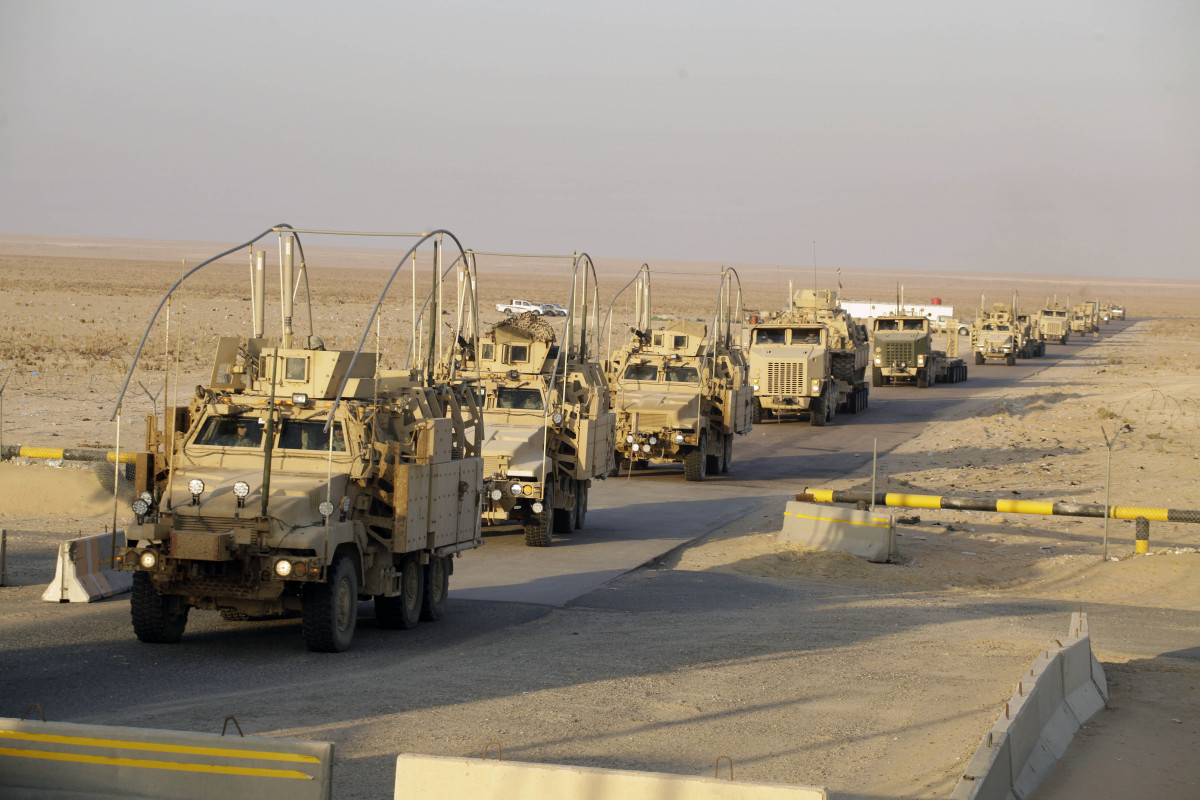

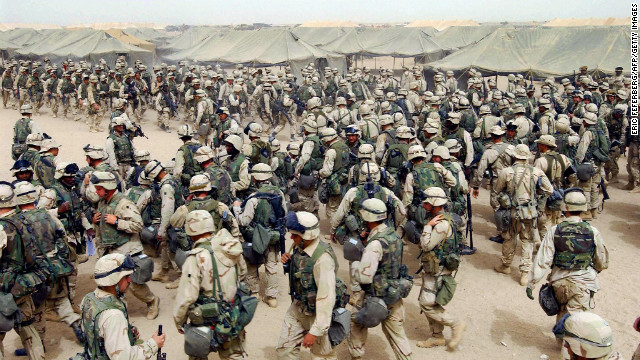 U.S. Marines in northern Kuwait gear up after receiving orders to cross the Iraqi border on March 20, 2003. It has been 10 years since the American-led invasion of Iraq that toppled the regime of Saddam Hussein. Look back at moments from the war and the legacy it left behind. For more, view
U.S. Marines in northern Kuwait gear up after receiving orders to cross the Iraqi border on March 20, 2003. It has been 10 years since the American-led invasion of Iraq that toppled the regime of Saddam Hussein. Look back at moments from the war and the legacy it left behind. For more, view 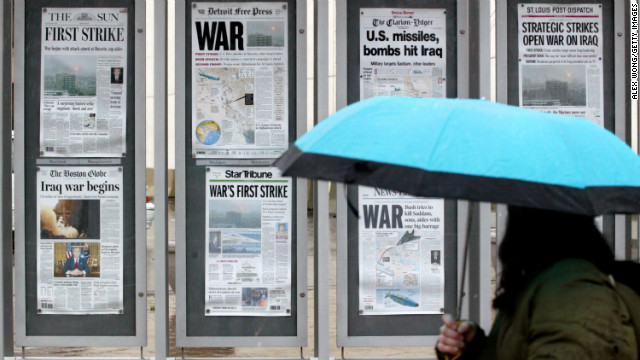 A pedestrian looks at front-page headlines on display outside the future site of the Newseum in Washington on March 20, 2003.
A pedestrian looks at front-page headlines on display outside the future site of the Newseum in Washington on March 20, 2003.
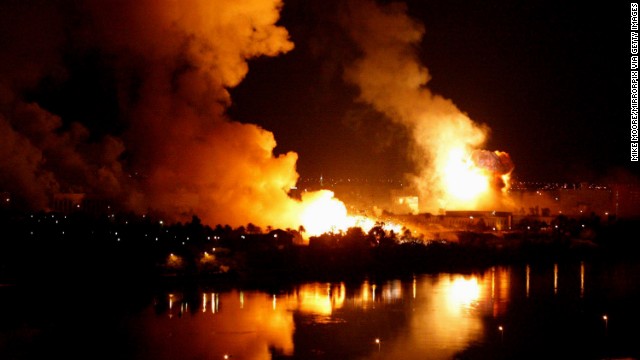 Smoke and flames rise from the riverside presidential palace compound in Baghdad after a massive airstrike on March 21, 2003.
Smoke and flames rise from the riverside presidential palace compound in Baghdad after a massive airstrike on March 21, 2003.
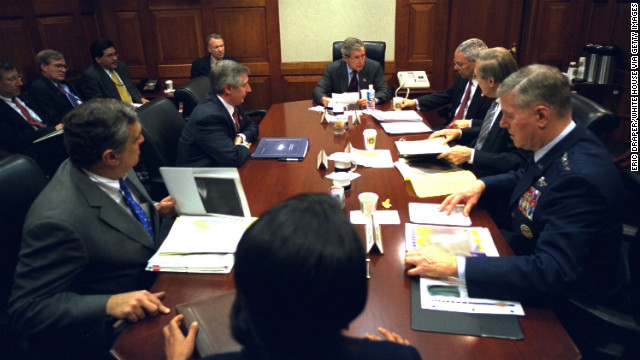 President George W. Bush meets with his war council in the Situation Room of the White House on March 21, 2003. Clockwise from foreground: National Security Adviser Condoleezza Rice, CIA Director George Tenet, Chief of Staff Andy Card, Secretary of State Colin Powell, Secretary of Defense Donald Rumsfeld and Chairman of the Joint Chiefs of Staff Gen. Richard Myers were present.
President George W. Bush meets with his war council in the Situation Room of the White House on March 21, 2003. Clockwise from foreground: National Security Adviser Condoleezza Rice, CIA Director George Tenet, Chief of Staff Andy Card, Secretary of State Colin Powell, Secretary of Defense Donald Rumsfeld and Chairman of the Joint Chiefs of Staff Gen. Richard Myers were present.
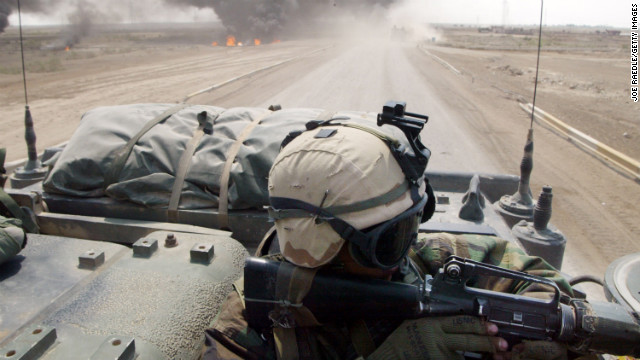 A U.S. Marine from Task Force Tarawa engages Iraqi forces from an armored assault vehicle on March 23, 2003, in the southern city of Nasiriyah.
A U.S. Marine from Task Force Tarawa engages Iraqi forces from an armored assault vehicle on March 23, 2003, in the southern city of Nasiriyah.
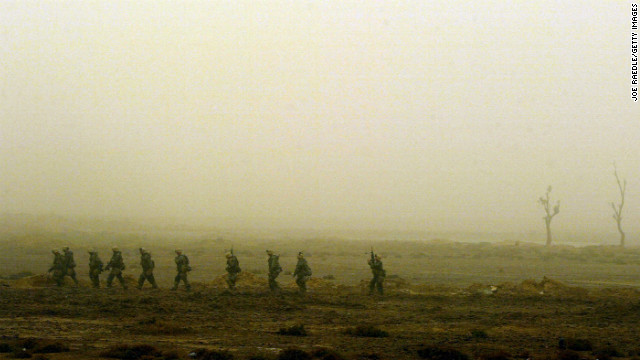 Marines walk single-file through the desolate landscape in Nasiriyah on March 26, 2003. As night falls on the city, the troops are on alert for a counterattack.
Marines walk single-file through the desolate landscape in Nasiriyah on March 26, 2003. As night falls on the city, the troops are on alert for a counterattack.
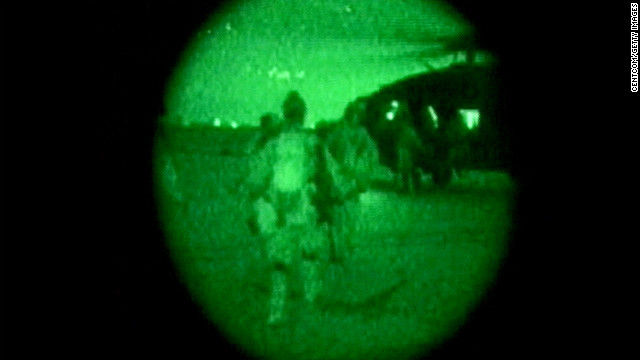 A night-vision image shows U.S. military personnel carrying Pfc. Jessica Lynch off a helicopter on April 1, 2003, at an undisclosed location in Iraq. She had been missing since March 23, when she and members of her unit were ambushed by Iraqi forces.
A night-vision image shows U.S. military personnel carrying Pfc. Jessica Lynch off a helicopter on April 1, 2003, at an undisclosed location in Iraq. She had been missing since March 23, when she and members of her unit were ambushed by Iraqi forces.
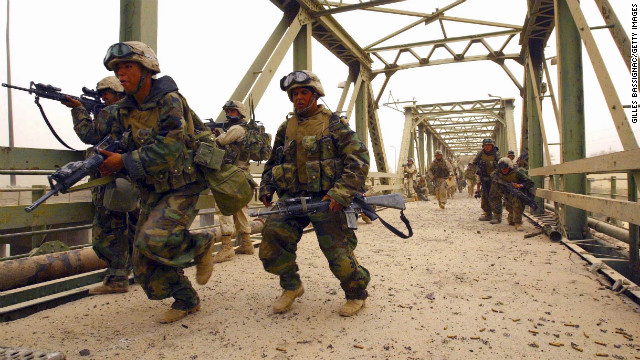 Members of the 3rd Battalion, 4th Marines, storm Diyala Bridge in Baghdad on April 7, 2003.
Members of the 3rd Battalion, 4th Marines, storm Diyala Bridge in Baghdad on April 7, 2003.
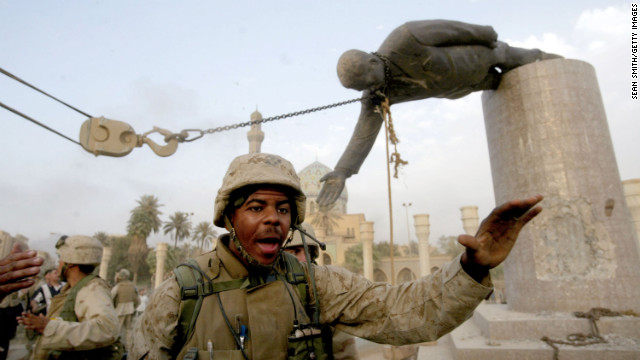 Marines pull down a statue of Saddam Hussein, a symbolic finale to the fall of Baghdad, on April 9, 2003.
Marines pull down a statue of Saddam Hussein, a symbolic finale to the fall of Baghdad, on April 9, 2003.
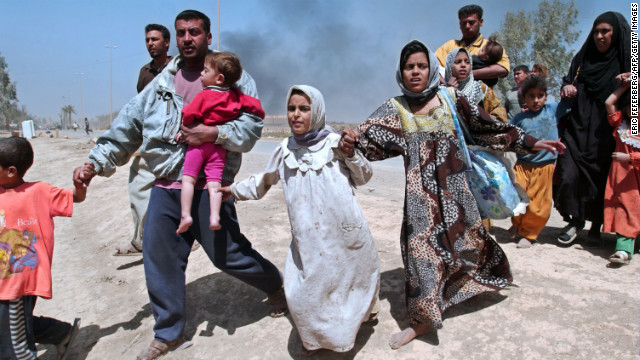 Iraqis flee Baghdad on April 11, 2003, as the capital city descended into chaos with widespread looting and lawlessness.
Iraqis flee Baghdad on April 11, 2003, as the capital city descended into chaos with widespread looting and lawlessness.
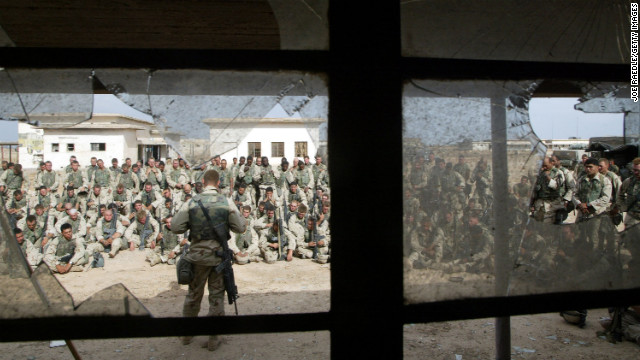 Marines hold a memorial service for friends killed in a battle weeks earlier on April 13, 2003, near Al-Kut, Iraq.
Marines hold a memorial service for friends killed in a battle weeks earlier on April 13, 2003, near Al-Kut, Iraq.
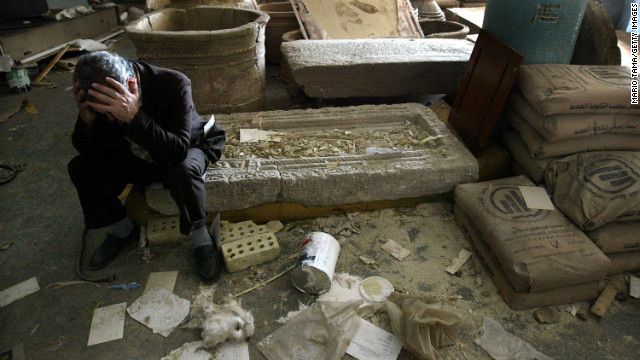 Iraqi National Museum Deputy Director Mushin Hasan sits among destroyed artifacts on April 13, 2003, in Bagdhad. The museum was severely looted.
Iraqi National Museum Deputy Director Mushin Hasan sits among destroyed artifacts on April 13, 2003, in Bagdhad. The museum was severely looted.
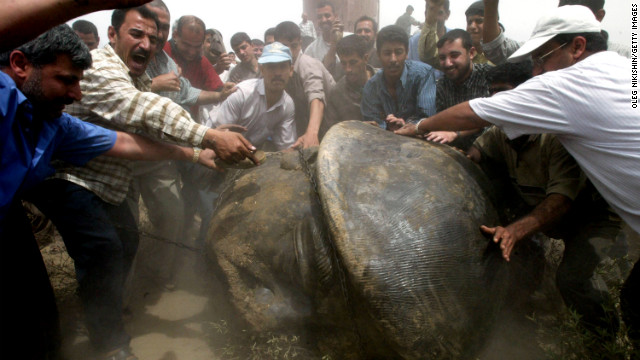 Iraqi men push the head of a statue of Saddam Hussein after its destruction on April 18, 2003, in Baghdad.
Iraqi men push the head of a statue of Saddam Hussein after its destruction on April 18, 2003, in Baghdad.
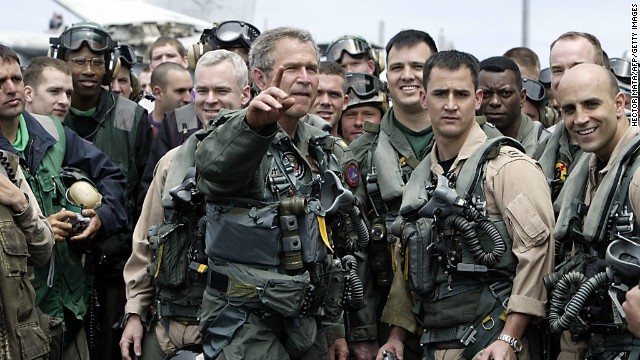 Dressed in a flight suit, President Bush meets pilots and crew members of the aircraft carrier USS Abraham Lincoln who were returning to the United States on May 1, 2003, after being deployed in the Gulf region.
Dressed in a flight suit, President Bush meets pilots and crew members of the aircraft carrier USS Abraham Lincoln who were returning to the United States on May 1, 2003, after being deployed in the Gulf region.
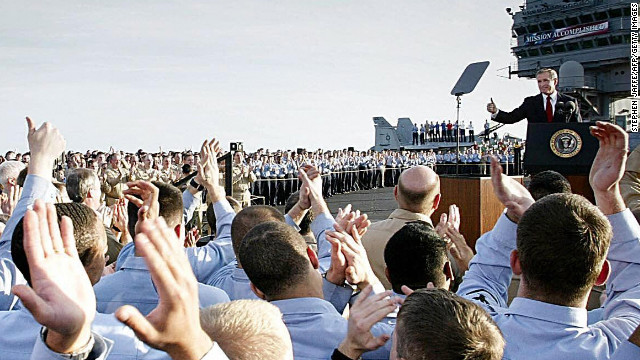 Sailors applaud as President Bush addresses the nation aboard the USS Abraham Lincoln on May 1, 2003. Standing beneath a banner that read "Mission Accomplished," the president declared major fighting over in Iraq and called it a victory in the ongoing war on terrorism.
Sailors applaud as President Bush addresses the nation aboard the USS Abraham Lincoln on May 1, 2003. Standing beneath a banner that read "Mission Accomplished," the president declared major fighting over in Iraq and called it a victory in the ongoing war on terrorism.
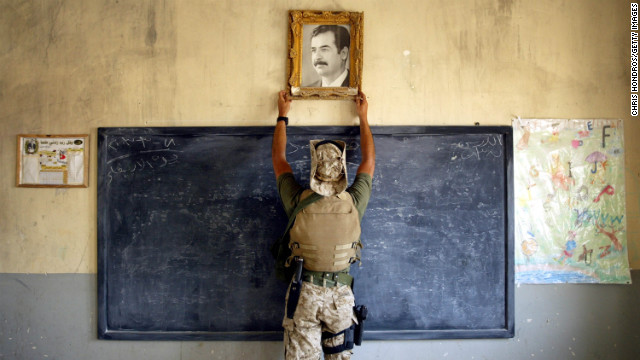 A U.S. Marine pulls down a picture of Saddam Hussein at a school in Al-Kut on April 16, 2003.
A U.S. Marine pulls down a picture of Saddam Hussein at a school in Al-Kut on April 16, 2003.
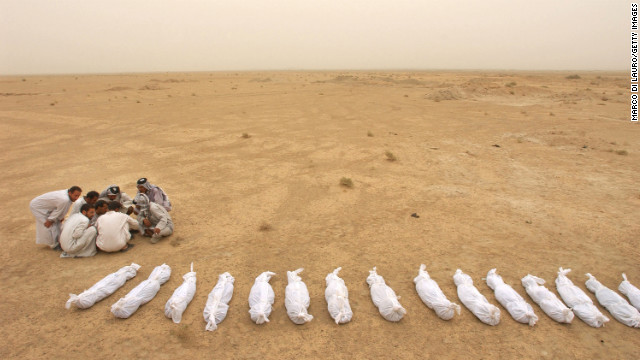 Iraqi men check a list near the remains of bodies excavated from a mass grave on the outskirts of Al Musayyib on May 31, 2003. Locals said they uncovered the remains of hundreds of Shiite Muslims allegedly executed by Saddam Hussein's regime after their uprising following the 1991 Gulf War.
Iraqi men check a list near the remains of bodies excavated from a mass grave on the outskirts of Al Musayyib on May 31, 2003. Locals said they uncovered the remains of hundreds of Shiite Muslims allegedly executed by Saddam Hussein's regime after their uprising following the 1991 Gulf War.
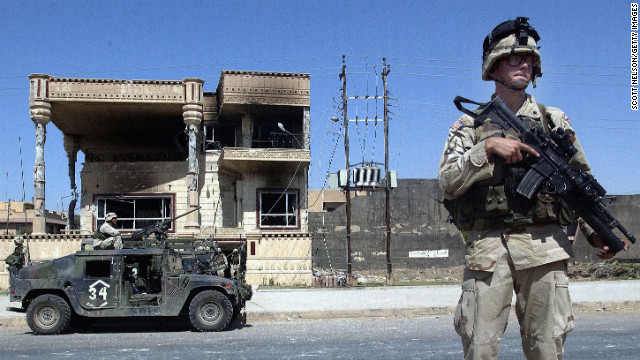 U.S. Army 101st Airborne troops investigate a house where Saddam Hussein's sons Uday and Qusay were killed in Mosul, Iraq, on July 23, 2003. The house, in an affluent neighborhood, was the scene of a fierce gunbattle.
U.S. Army 101st Airborne troops investigate a house where Saddam Hussein's sons Uday and Qusay were killed in Mosul, Iraq, on July 23, 2003. The house, in an affluent neighborhood, was the scene of a fierce gunbattle.
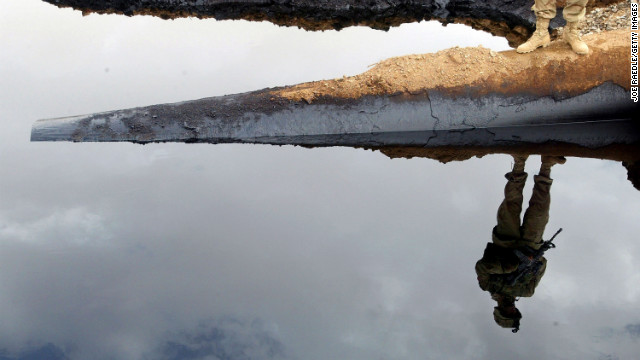 Army Cpl. Curtis Laymon of the 101st Airborne Rakkasan regiment is reflected in a pool of oil from the Iraqi-Turkey pipeline in Iraq's Ninewa province on October 29, 2003. The pipeline was blown apart by saboteurs two weeks earlier.
Army Cpl. Curtis Laymon of the 101st Airborne Rakkasan regiment is reflected in a pool of oil from the Iraqi-Turkey pipeline in Iraq's Ninewa province on October 29, 2003. The pipeline was blown apart by saboteurs two weeks earlier.
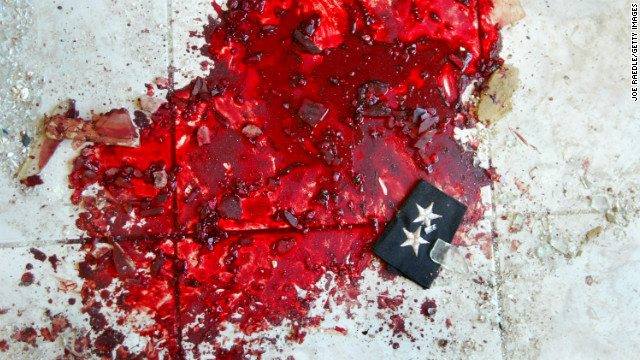 An Iraqi police lieutenant's stars lie in a puddle of blood after a car bombing that targeted a police station in Baquba on November 22, 2003.
An Iraqi police lieutenant's stars lie in a puddle of blood after a car bombing that targeted a police station in Baquba on November 22, 2003.
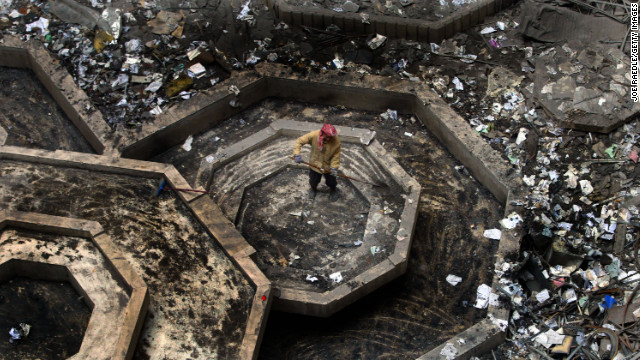 A construction worker removes debris from a destroyed building in Baghdad on December 11, 2003.
A construction worker removes debris from a destroyed building in Baghdad on December 11, 2003.
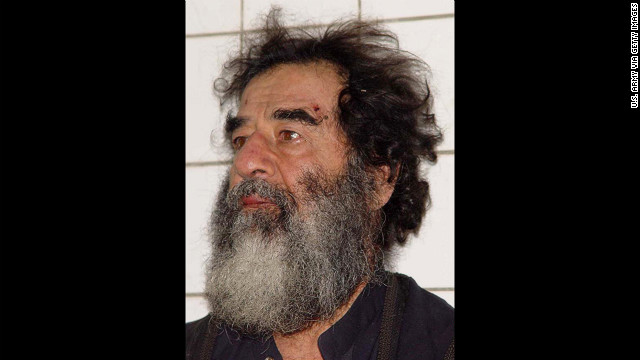 Saddam Hussein's picture is taken December 14, 2003, after his capture a day earlier. U.S. troops found Hussein hiding near his hometown of Tikrit.
Saddam Hussein's picture is taken December 14, 2003, after his capture a day earlier. U.S. troops found Hussein hiding near his hometown of Tikrit.
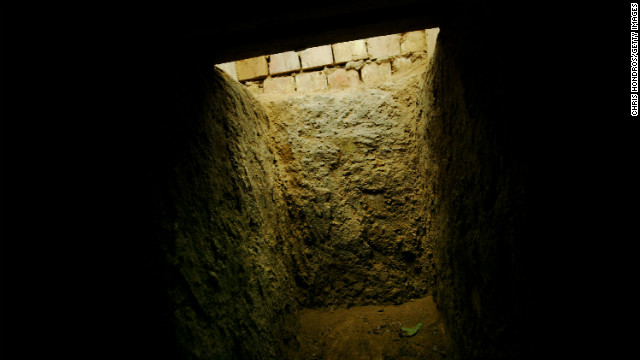 The entrance to the "spider hole" where Saddam Hussein was hiding in Ad Dawr is seen from the inside on December 15, 2003.
The entrance to the "spider hole" where Saddam Hussein was hiding in Ad Dawr is seen from the inside on December 15, 2003.
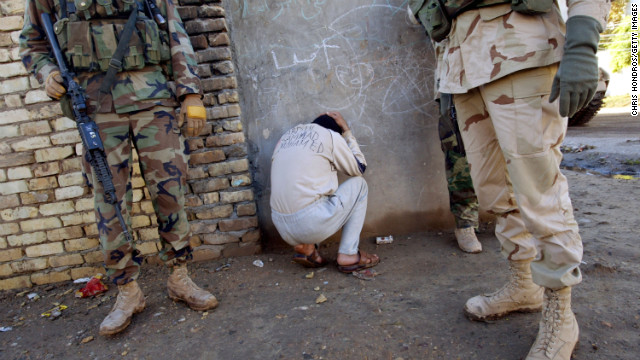 A bound Iraqi informer, with his name inked in English across his back, crouches beside soldiers in the 4th Infantry Division after providing outdated information during a morning raid in in Samarra on December 19, 2003.
A bound Iraqi informer, with his name inked in English across his back, crouches beside soldiers in the 4th Infantry Division after providing outdated information during a morning raid in in Samarra on December 19, 2003.
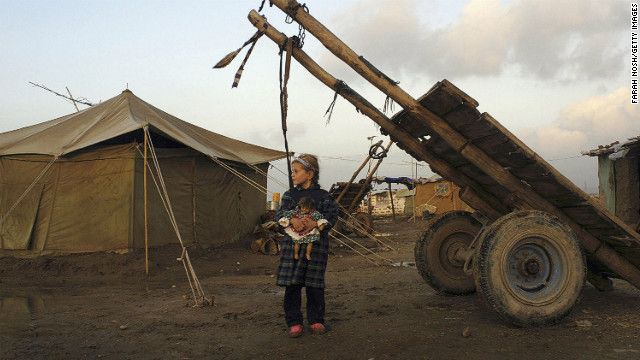 Eman Mohammed, 7, stands in the Kurdish refugee camp in Kirkuk on January 7, 2004. Since 2003, thousands of internally displaced Kurds have returned to Kirkuk.
Eman Mohammed, 7, stands in the Kurdish refugee camp in Kirkuk on January 7, 2004. Since 2003, thousands of internally displaced Kurds have returned to Kirkuk.
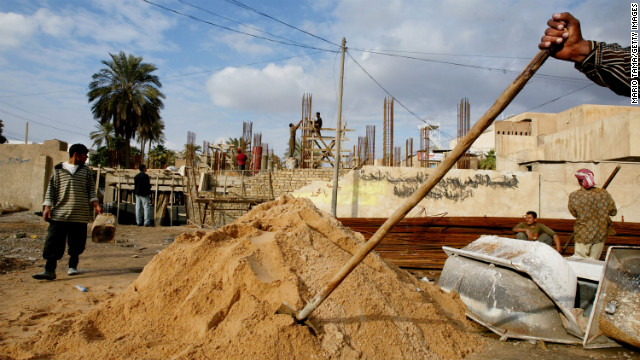 Laborers work on a hotel in Baghdad on January 15, 2004.
Laborers work on a hotel in Baghdad on January 15, 2004.
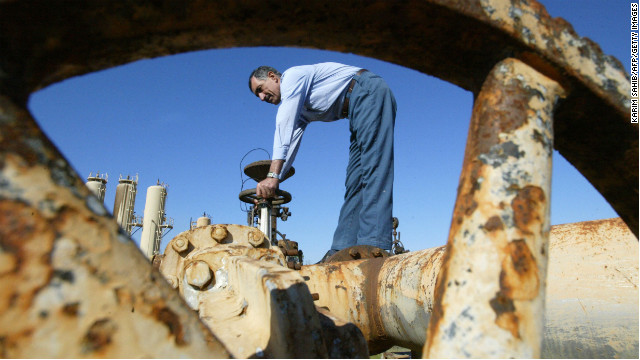 A worker turns a valve at the Shirawa oil field outside the northern city of Kirkuk on January 19, 2004. The security of Iraq's oil infrastructure had improved, but exports through the region's main pipeline had yet to resume.
A worker turns a valve at the Shirawa oil field outside the northern city of Kirkuk on January 19, 2004. The security of Iraq's oil infrastructure had improved, but exports through the region's main pipeline had yet to resume.
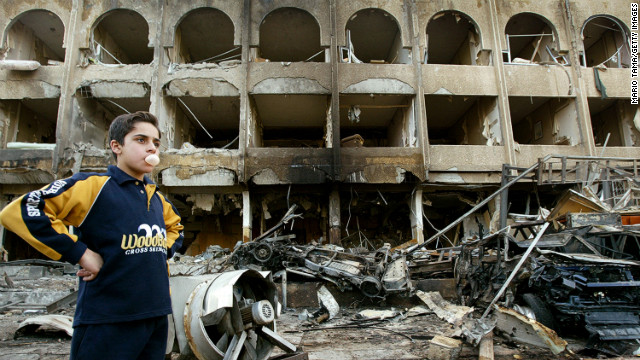 A boy stands at the scene of a car bombing in front of the Shaheen Hotel in Baghdad on January 28, 2004.
A boy stands at the scene of a car bombing in front of the Shaheen Hotel in Baghdad on January 28, 2004.
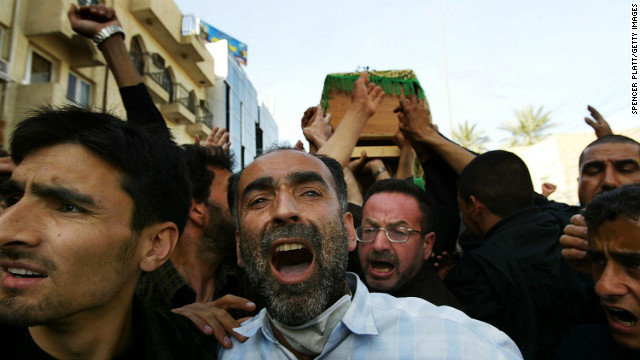 Mourners carry coffins in Karbala on March 3, 2004. A day after a series of bombs killed dozens and injured hundreds during the Ashura ceremony in the Shiite holy city of Karbala, Shiite Muslims began burying their dead.
Mourners carry coffins in Karbala on March 3, 2004. A day after a series of bombs killed dozens and injured hundreds during the Ashura ceremony in the Shiite holy city of Karbala, Shiite Muslims began burying their dead.
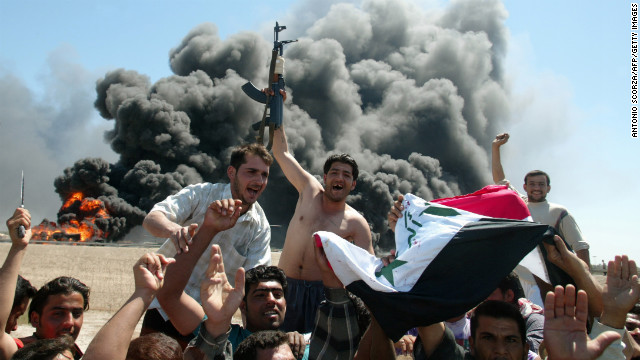 Iraqi insurgents wave their national flag as they celebrate in front of a burning U.S. military tanker they hit with rocket-propelled grenade on April 9, 2004. The attack took place on the road from Baghdad to Fallujah.
Iraqi insurgents wave their national flag as they celebrate in front of a burning U.S. military tanker they hit with rocket-propelled grenade on April 9, 2004. The attack took place on the road from Baghdad to Fallujah.
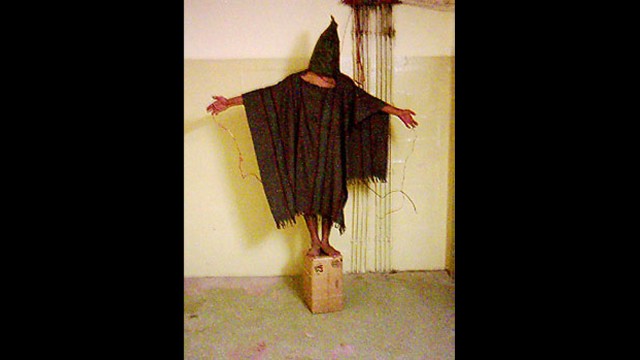 Photographs depicting detainee abuse inside Abu Ghraib prison at the hands of U.S. troops were released in late April 2004. The fallout was immediate, and the images gave anti-war protesters ammunition to rally people to their cause.
Photographs depicting detainee abuse inside Abu Ghraib prison at the hands of U.S. troops were released in late April 2004. The fallout was immediate, and the images gave anti-war protesters ammunition to rally people to their cause.
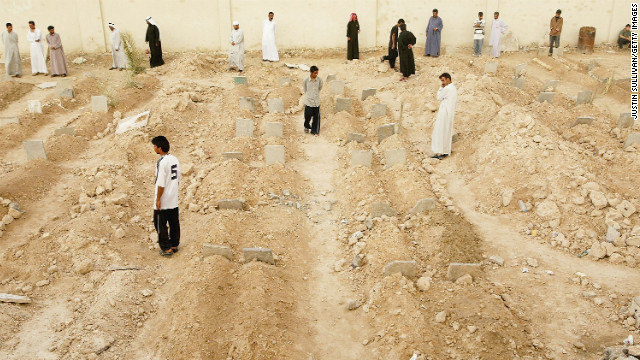 Iraqis look at rows of graves at an overflowing cemetery built in a soccer arena in Fallujah on May 3, 2004.
Iraqis look at rows of graves at an overflowing cemetery built in a soccer arena in Fallujah on May 3, 2004.
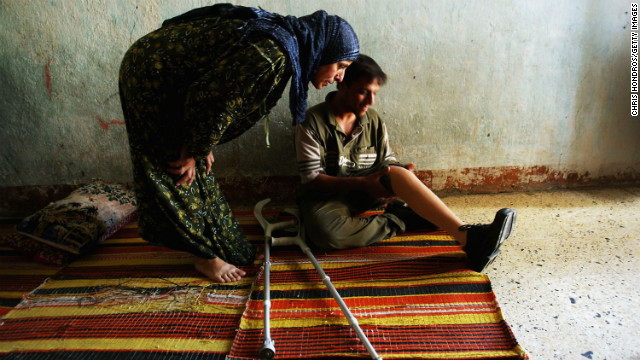 At home in Baghdad with his new prosthetic leg, Ahsan Hameed, 20, sits while his aunt looks it over on July 17, 2004. He lost his left leg above the knee to a stray bullet in April.
At home in Baghdad with his new prosthetic leg, Ahsan Hameed, 20, sits while his aunt looks it over on July 17, 2004. He lost his left leg above the knee to a stray bullet in April.
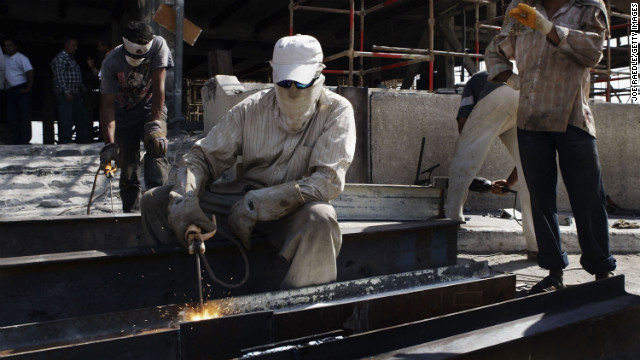 Construction workers weld beams at the Ministry of Transportation building in Baghdad on July 21, 2004. The building was being rebuilt after it was gutted by a fire.
Construction workers weld beams at the Ministry of Transportation building in Baghdad on July 21, 2004. The building was being rebuilt after it was gutted by a fire.
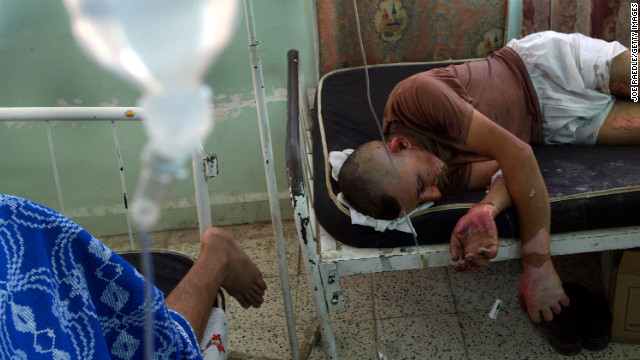 Iraqi national guardsman Ridha Abdulkarim lies in a hospital bed after a car bomb detonated at a checkpoint in Baquba on August 3, 2004. The bomb killed six guardsmen and wounded six others, Iraqi authorities said.
Iraqi national guardsman Ridha Abdulkarim lies in a hospital bed after a car bomb detonated at a checkpoint in Baquba on August 3, 2004. The bomb killed six guardsmen and wounded six others, Iraqi authorities said.
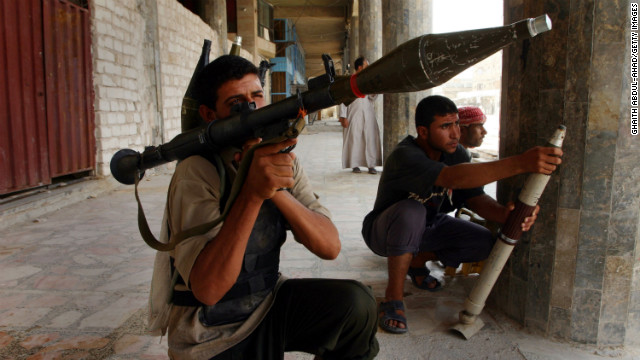 Shiite militia members prepare to fire during clashes with U.S. forces in Najaf on August 7, 2004. It was the third day of continuous fighting in the holy city.
Shiite militia members prepare to fire during clashes with U.S. forces in Najaf on August 7, 2004. It was the third day of continuous fighting in the holy city.
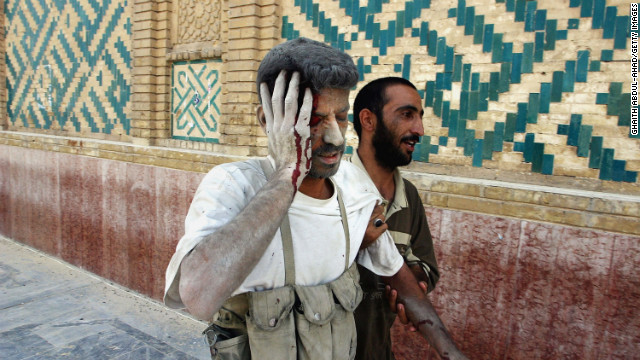 An Iraqi militia member injured in a U.S. airstrike in Najaf is assisted by one of his comrades on August 24, 2004. They were walking past the shrine of Imam Ali to make their way to a militia hospital.
An Iraqi militia member injured in a U.S. airstrike in Najaf is assisted by one of his comrades on August 24, 2004. They were walking past the shrine of Imam Ali to make their way to a militia hospital.
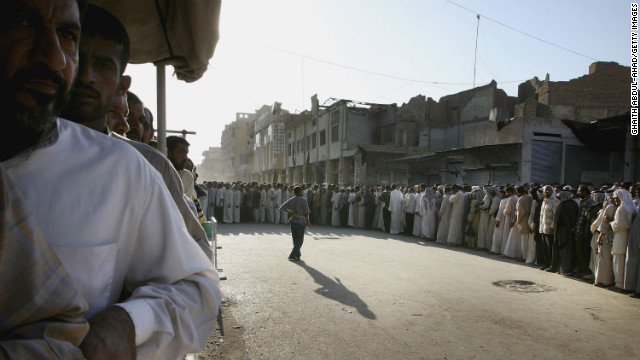 Iraqi Shiite faithful gather in Najaf on August 27, 2004, to mark the end of a battle. Rebel leader Muqtada al-Sadr ordered his fighters to lay down their arms in a peace deal brokered by Iraq's most revered Shiite cleric, Grand Ayatollah Ali al-Sistani.
Iraqi Shiite faithful gather in Najaf on August 27, 2004, to mark the end of a battle. Rebel leader Muqtada al-Sadr ordered his fighters to lay down their arms in a peace deal brokered by Iraq's most revered Shiite cleric, Grand Ayatollah Ali al-Sistani.
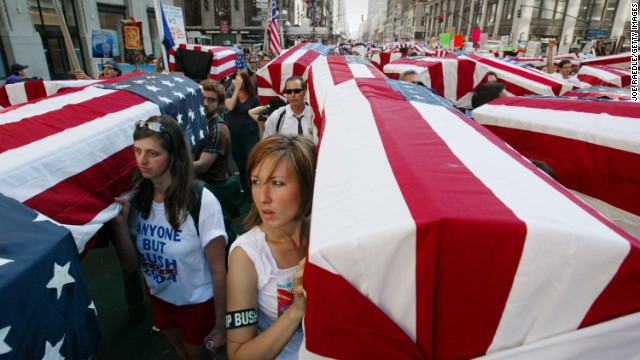 Anti-war protesters in New York carry mock coffins draped with U.S. flags on August 29, 2004. Thousands took part in demonstrations outside Madison Square Garden on the eve of the Republican National Convention.
Anti-war protesters in New York carry mock coffins draped with U.S. flags on August 29, 2004. Thousands took part in demonstrations outside Madison Square Garden on the eve of the Republican National Convention.
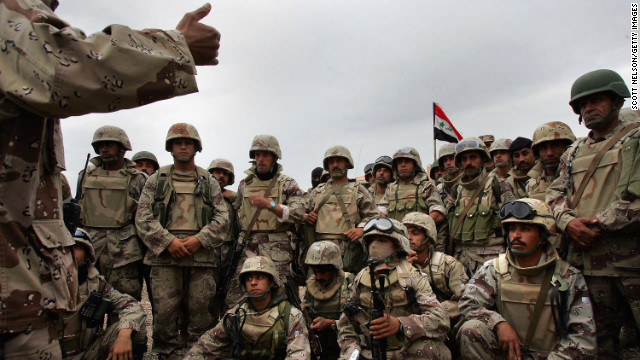 Members of the Iraqi Intervention Forces listen to last-minute instructions before heading out with U.S. troops to begin a major offensive on the insurgent stronghold of Fallujah on November 8, 2004.
Members of the Iraqi Intervention Forces listen to last-minute instructions before heading out with U.S. troops to begin a major offensive on the insurgent stronghold of Fallujah on November 8, 2004.
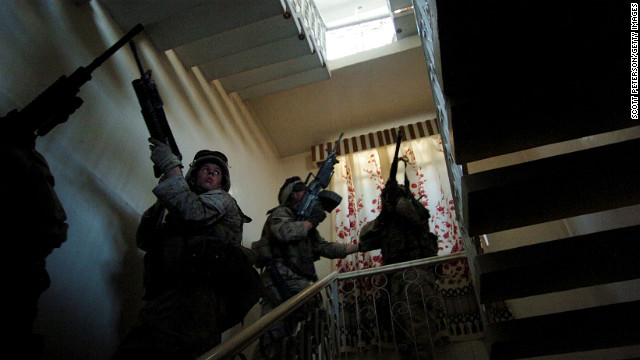 Marines search houses in Fallujah for insurgents on November 10, 2004.
Marines search houses in Fallujah for insurgents on November 10, 2004.
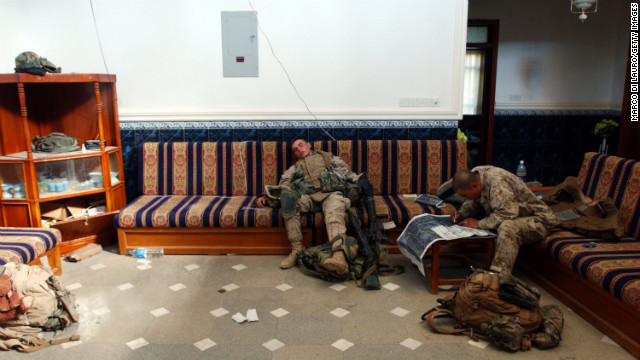 Marines rest and check a map in a house during an offensive in Fallujah on November 11, 2004.
Marines rest and check a map in a house during an offensive in Fallujah on November 11, 2004.
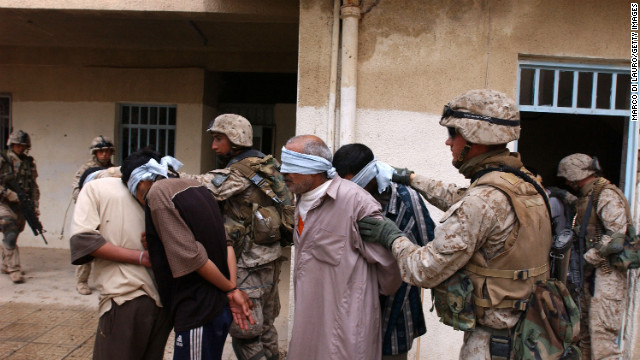 Iraqi men are arrested during a house raid in Fallujah on November 13, 2004.
Iraqi men are arrested during a house raid in Fallujah on November 13, 2004.
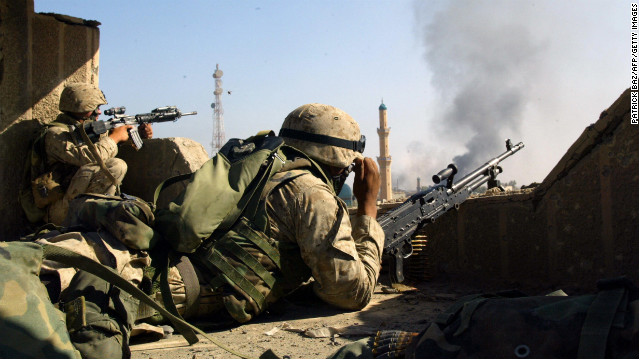 Marines take position on a roof in the restive city of Fallujah on November 13, 2004.
Marines take position on a roof in the restive city of Fallujah on November 13, 2004.
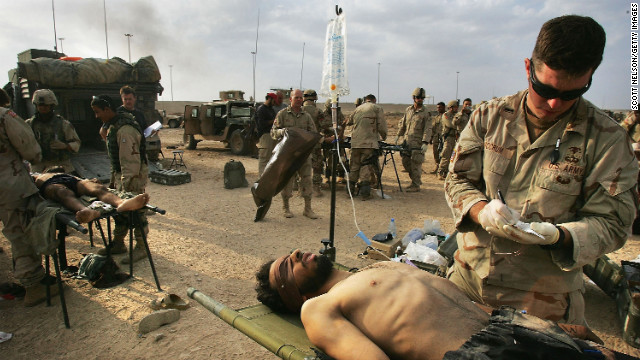 U.S. Army medics treat a wounded Jordanian fighter in Fallujah on November 14, 2004.
U.S. Army medics treat a wounded Jordanian fighter in Fallujah on November 14, 2004.
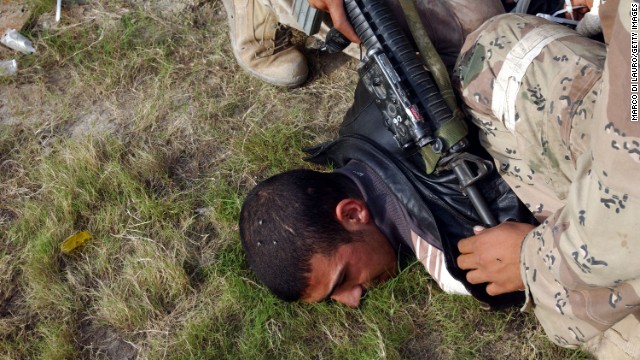 A U.S. Marine and a soldier from the New Iraqi Army process a detainee during operations in Fallujah on November 17, 2004.
A U.S. Marine and a soldier from the New Iraqi Army process a detainee during operations in Fallujah on November 17, 2004.
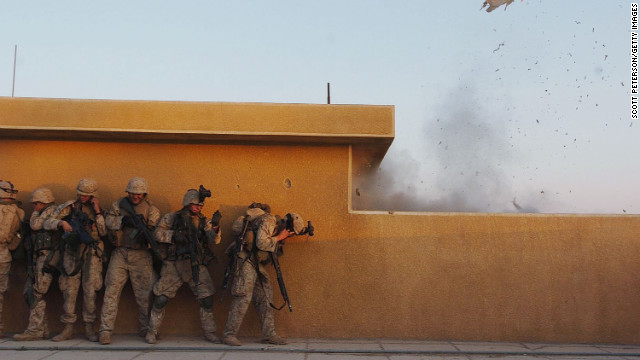 Marines use explosives to open rooftop doors while searching houses in Fallujah for insurgents on November 22, 2004.
Marines use explosives to open rooftop doors while searching houses in Fallujah for insurgents on November 22, 2004.
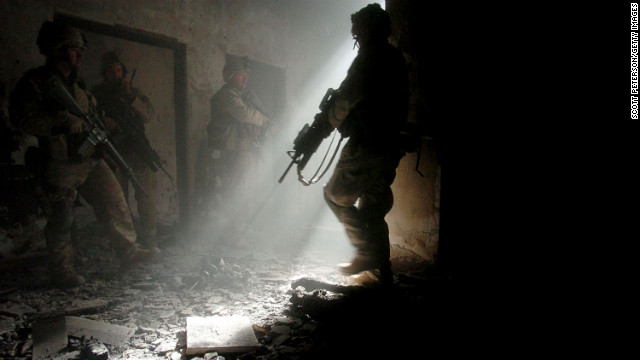 Marines clear a home in Fallujah after four insurgents staged a bloody counterattack, killing one American and wounding many others, on November 23, 2004.
Marines clear a home in Fallujah after four insurgents staged a bloody counterattack, killing one American and wounding many others, on November 23, 2004.
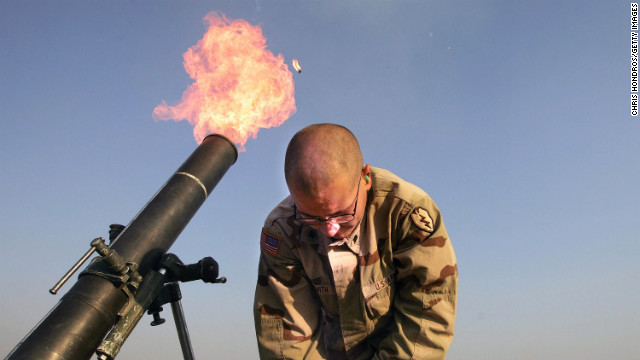 Spc. Franklin Smith pulls away as a mortar blast is fired from the edge of the U.S. airbase in Tal Afar on January 17, 2005. U.S. teams would frequently fire "harassment and interdiction" mortar fusillades toward suspected enemy positions.
Spc. Franklin Smith pulls away as a mortar blast is fired from the edge of the U.S. airbase in Tal Afar on January 17, 2005. U.S. teams would frequently fire "harassment and interdiction" mortar fusillades toward suspected enemy positions.
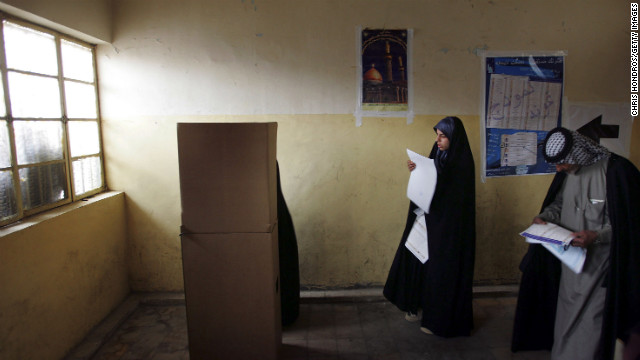 Iraqis look over their ballots on election day in the Sadr City neighborhood of Baghdad on January 30, 2005. It was the country's first multiparty election in half a century.
Iraqis look over their ballots on election day in the Sadr City neighborhood of Baghdad on January 30, 2005. It was the country's first multiparty election in half a century.
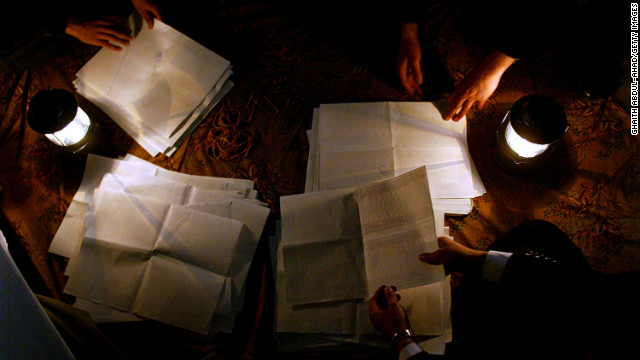 Election officials count ballot papers at night on January 30, 2005, in the Shiite holy city of Najaf. Despite threats, thousands of men and women cast their votes.
Election officials count ballot papers at night on January 30, 2005, in the Shiite holy city of Najaf. Despite threats, thousands of men and women cast their votes.
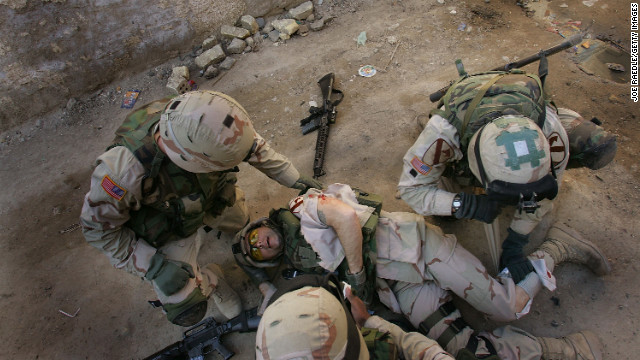 Army Sgt. 1st Class Troy Hawkins is tended to after getting wounded during a firefight while on patrol with an Iraqi army unit in the Haifa Street neighborhood of Baghdad on February 16, 2005. Afterward, he continued to fight in the narrow streets.
Army Sgt. 1st Class Troy Hawkins is tended to after getting wounded during a firefight while on patrol with an Iraqi army unit in the Haifa Street neighborhood of Baghdad on February 16, 2005. Afterward, he continued to fight in the narrow streets.
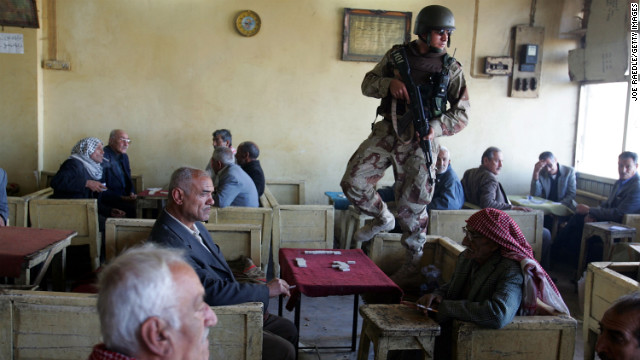 An Iraqi soldier stands watch at a teahouse while on patrol with U.S. soldiers in Baghdad on February 23, 2005.
An Iraqi soldier stands watch at a teahouse while on patrol with U.S. soldiers in Baghdad on February 23, 2005.
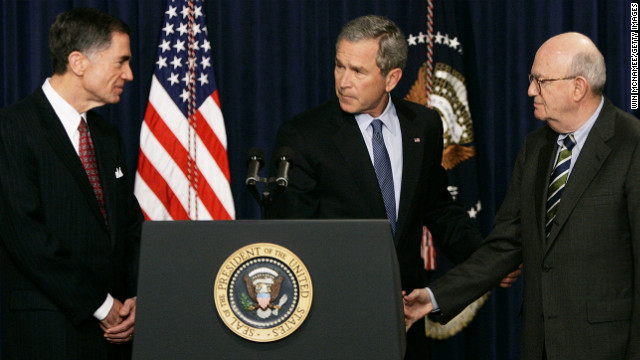 President Bush shakes hands with former Sen. Charles Robb, left, and Judge Laurence Silberman during a news conference in Washington on March 31, 2005. The co-chairmen of the Iraqi Intelligence Commission issued a report indicating that U.S. intelligence agencies were wrong in most pre-war assessments about weapons of mass destruction in Iraq.
President Bush shakes hands with former Sen. Charles Robb, left, and Judge Laurence Silberman during a news conference in Washington on March 31, 2005. The co-chairmen of the Iraqi Intelligence Commission issued a report indicating that U.S. intelligence agencies were wrong in most pre-war assessments about weapons of mass destruction in Iraq.
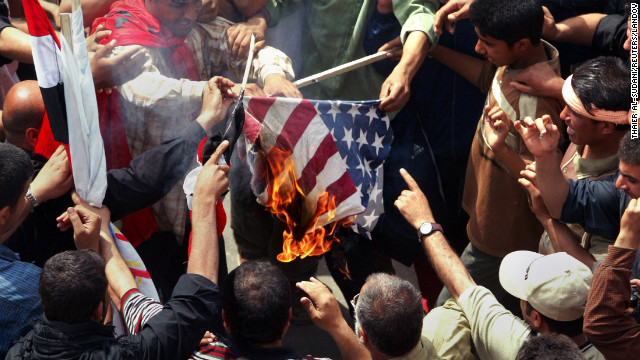 Iraqi Shiite demonstrators loyal to cleric Muqtada al-Sadr burn a U.S. flag during a protest in Baghdad on April 9, 2005. The rally was called on the second anniversary of the fall of Baghdad, with protesters demanding an end to the U.S. military presence in Iraq.
Iraqi Shiite demonstrators loyal to cleric Muqtada al-Sadr burn a U.S. flag during a protest in Baghdad on April 9, 2005. The rally was called on the second anniversary of the fall of Baghdad, with protesters demanding an end to the U.S. military presence in Iraq.
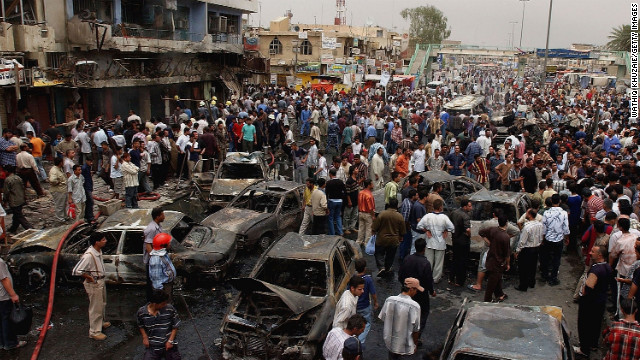 People gather at the scene of a car bombing near a busy market in eastern Baghdad on May, 12, 2005.
People gather at the scene of a car bombing near a busy market in eastern Baghdad on May, 12, 2005.
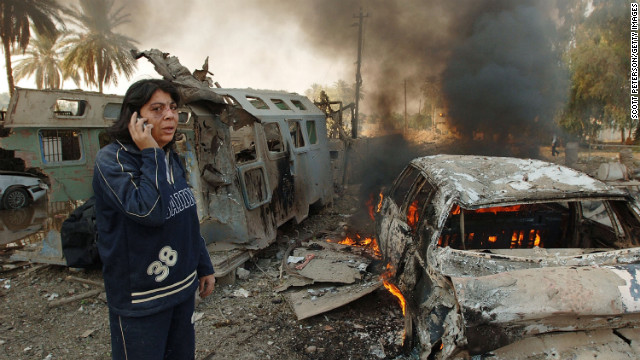 A resident makes a phone call in the aftermath of a double suicide car bombing that struck civilians living near the blast walls that protect the Hamra Hotel in Baghdad on November 18, 2005.
A resident makes a phone call in the aftermath of a double suicide car bombing that struck civilians living near the blast walls that protect the Hamra Hotel in Baghdad on November 18, 2005.
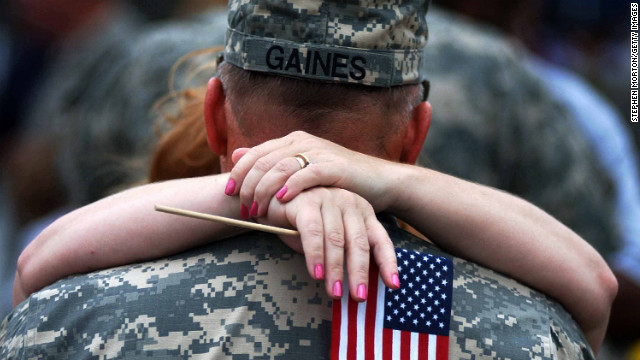 Sgt. Thomas Gaines kisses his wife during a welcome-home ceremony in Fort Stewart, Georgia, on May 11, 2006. About 280 members of the Georgia National Guard 48th Brigade returned home from a year-long deployment to Iraq.
Sgt. Thomas Gaines kisses his wife during a welcome-home ceremony in Fort Stewart, Georgia, on May 11, 2006. About 280 members of the Georgia National Guard 48th Brigade returned home from a year-long deployment to Iraq.
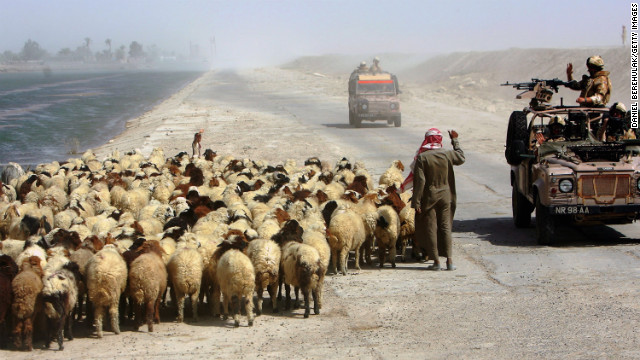 A British Royal Air Force gunner waves to a goat herder during a patrol of northern Basra province on July 26, 2006.
A British Royal Air Force gunner waves to a goat herder during a patrol of northern Basra province on July 26, 2006.
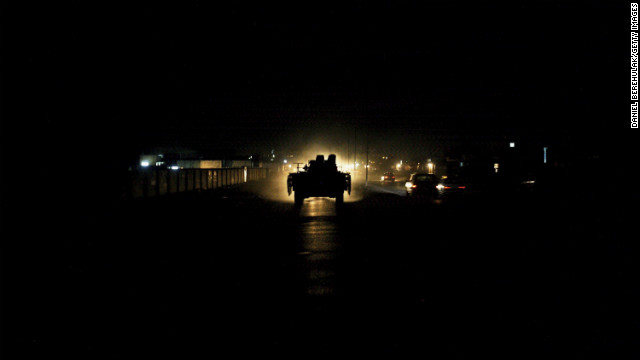 A British armored vehicle is illuminated by traffic during a patrol of Basra on July 27, 2006.
A British armored vehicle is illuminated by traffic during a patrol of Basra on July 27, 2006.
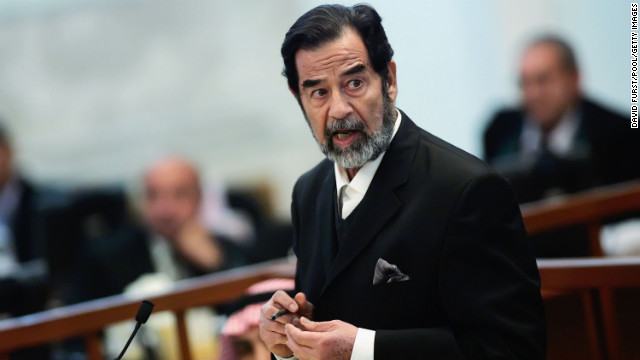 Ousted Iraqi leader Saddam Hussein addresses the court during his trial in the heavily fortified Green Zone of Baghdad on October 17, 2006. Hussein and six co-defendants were on trial for mass killings in the Anfal campaign against Kurdish rebels in the late 1980s.
Ousted Iraqi leader Saddam Hussein addresses the court during his trial in the heavily fortified Green Zone of Baghdad on October 17, 2006. Hussein and six co-defendants were on trial for mass killings in the Anfal campaign against Kurdish rebels in the late 1980s.
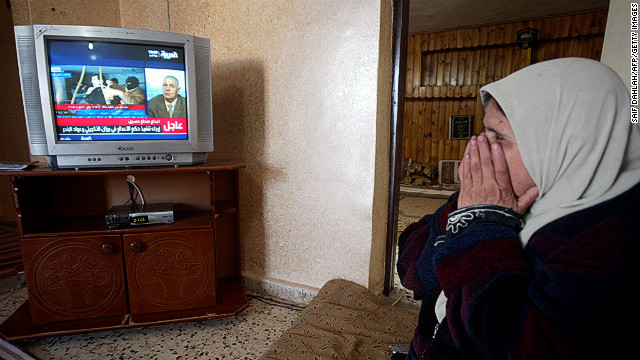 A Palestinian woman watches the news of Saddam Hussein's execution at her home in the West Bank town of Jenin on December 30, 2006. Hussein was hanged for his role in the 1982 Dujail massacre, in which 148 Iraqis were killed after a failed assassination attempt against the then-president.
A Palestinian woman watches the news of Saddam Hussein's execution at her home in the West Bank town of Jenin on December 30, 2006. Hussein was hanged for his role in the 1982 Dujail massacre, in which 148 Iraqis were killed after a failed assassination attempt against the then-president.
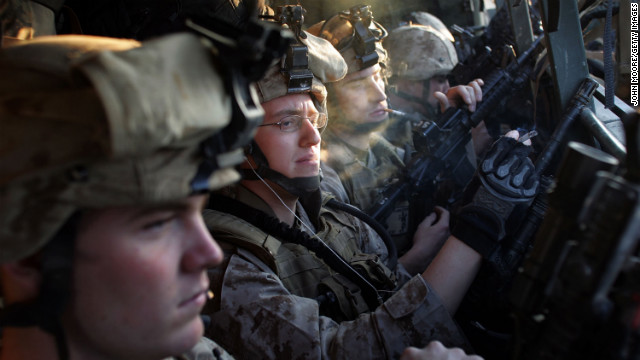 U.S. Marines prepare for a military operation at Camp Ramadi in Anbar province on January 14, 2007.
U.S. Marines prepare for a military operation at Camp Ramadi in Anbar province on January 14, 2007.
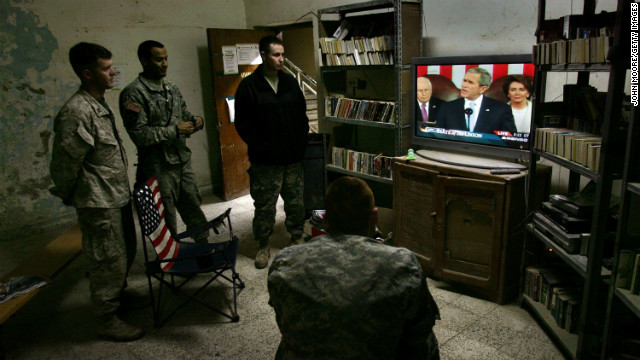 American forces in Ramadi watch President Bush deliver the annual State of the Union address on January 24, 2007. The president announced plans to increase the size of the U.S. military by 92,000 troops.
American forces in Ramadi watch President Bush deliver the annual State of the Union address on January 24, 2007. The president announced plans to increase the size of the U.S. military by 92,000 troops.
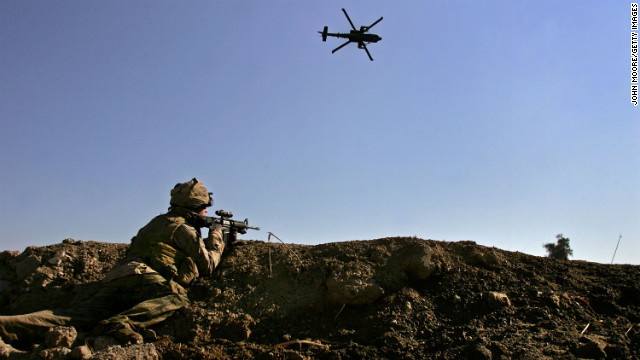 An American Apache helicopter provides air support while a Marine takes aim after being fired upon by insurgents near the Euphrates River in Ramadi on February 2, 2007.
An American Apache helicopter provides air support while a Marine takes aim after being fired upon by insurgents near the Euphrates River in Ramadi on February 2, 2007.
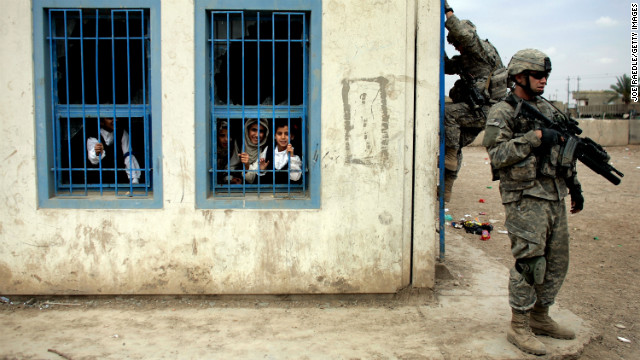 Iraqi children watch U.S. Army soldiers climb to the roof of their school to get a high vantage point in Baghdad on April 15, 2007.
Iraqi children watch U.S. Army soldiers climb to the roof of their school to get a high vantage point in Baghdad on April 15, 2007.
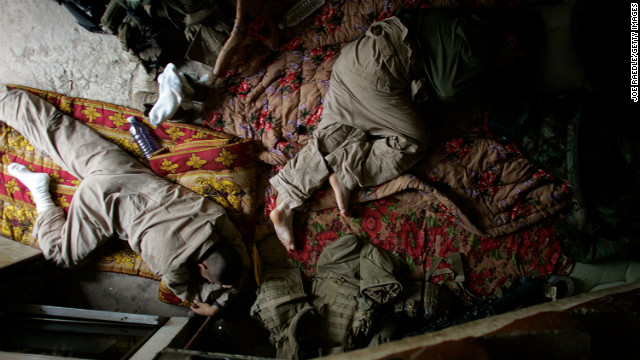 U.S. Marines sleep at their patrol base in the area known as Zaidon in Al Anbar province on May 12, 2007.
U.S. Marines sleep at their patrol base in the area known as Zaidon in Al Anbar province on May 12, 2007.
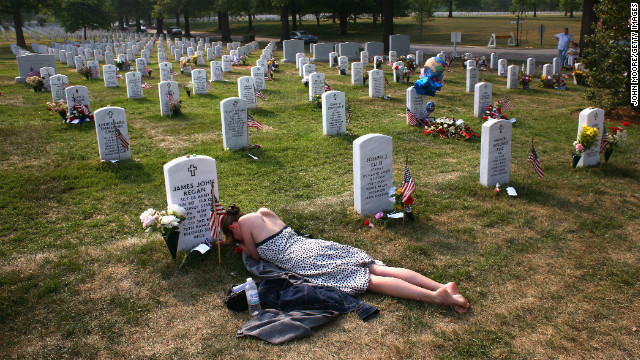 Mary McHugh mourns her fiance, Sgt. James Regan, at Arlington National Cemetery in Washington on May 27, 2007. The American Special Forces soldier was killed by an IED in Iraq in February.
Mary McHugh mourns her fiance, Sgt. James Regan, at Arlington National Cemetery in Washington on May 27, 2007. The American Special Forces soldier was killed by an IED in Iraq in February.
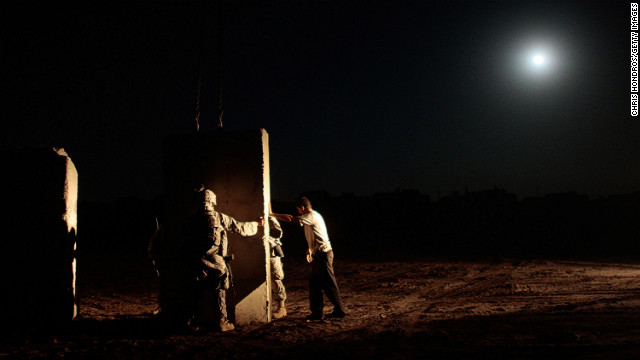 U.S. soldiers and an Iraqi contractor build a concrete wall between Sunni and Shiite areas of the south Dora neighborhood of Bagdhad in the early hours of July 4, 2007.
U.S. soldiers and an Iraqi contractor build a concrete wall between Sunni and Shiite areas of the south Dora neighborhood of Bagdhad in the early hours of July 4, 2007.
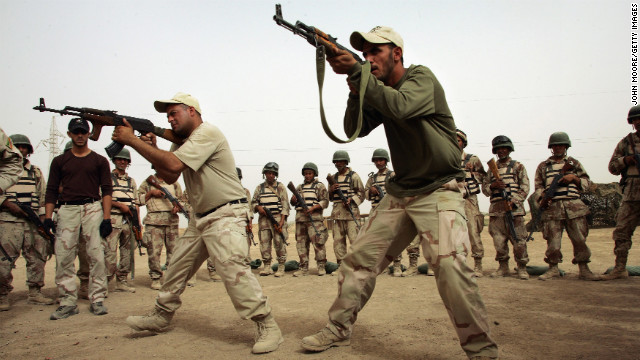 Iraqi army commandos teach junior soldiers during a combat training course in Baquba on July 18, 2007.
Iraqi army commandos teach junior soldiers during a combat training course in Baquba on July 18, 2007.
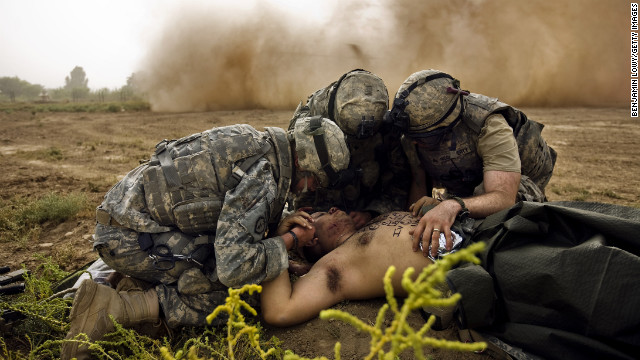 Medics treat Army Spc. Jose Callazo after his mine-detecting vehicle hit a buried IED in Hawr Rajab on August 4, 2007.
Medics treat Army Spc. Jose Callazo after his mine-detecting vehicle hit a buried IED in Hawr Rajab on August 4, 2007.
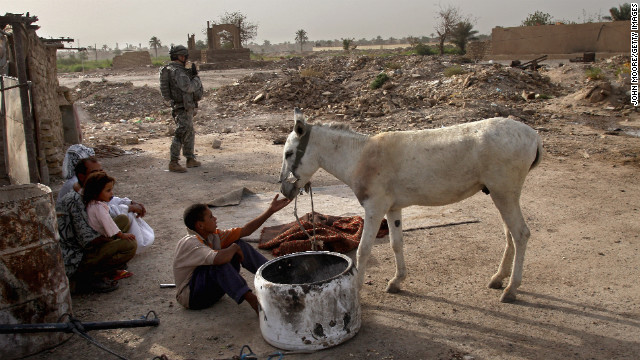 An American soldier prepares to search a home for illegal weapons in the Hurriyah neighborhood of Baghdad on September 9, 2007.
An American soldier prepares to search a home for illegal weapons in the Hurriyah neighborhood of Baghdad on September 9, 2007.
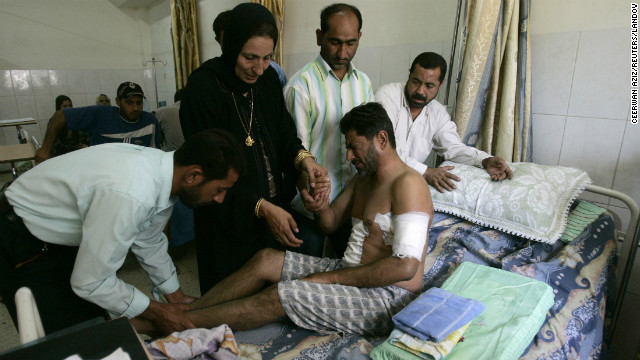 Relatives help an Iraqi man at a hospital in Baghdad on September 20, 2007. He was injured when Blackwater security contractors opened fire on civilians on September 16, killing 17. The company lost its contract to guard U.S. staff in Iraq after the country's government refused to renew its operating license.
Relatives help an Iraqi man at a hospital in Baghdad on September 20, 2007. He was injured when Blackwater security contractors opened fire on civilians on September 16, killing 17. The company lost its contract to guard U.S. staff in Iraq after the country's government refused to renew its operating license.
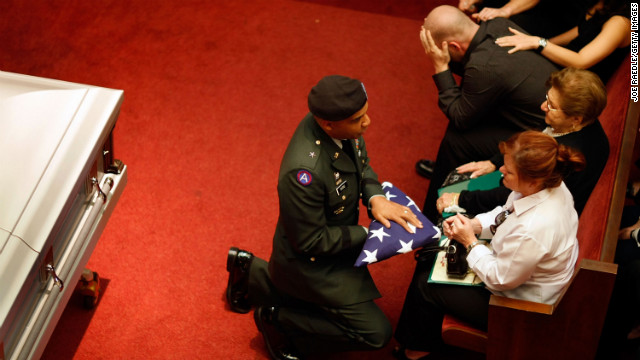 Army Brig. Gen. Nolen V. Bivens presents an American flag to Maribel Ferrero during the funeral of her 23-year-old son, Army Pfc. Marius L. Ferrero, in Miami. He was killed by a roadside bomb while serving in Iraq.
Army Brig. Gen. Nolen V. Bivens presents an American flag to Maribel Ferrero during the funeral of her 23-year-old son, Army Pfc. Marius L. Ferrero, in Miami. He was killed by a roadside bomb while serving in Iraq.
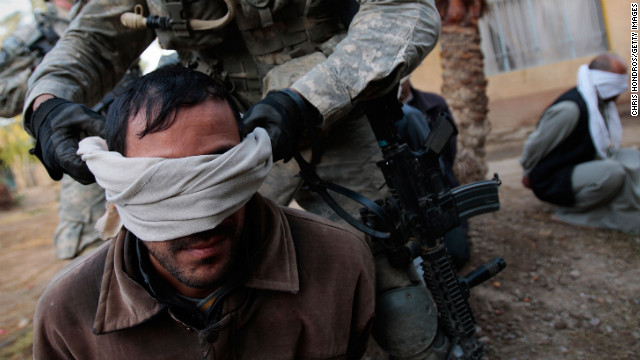 A U.S. soldier blindfolds an Iraqi man during a raid in Mukhisa on December 3, 2007. Seven men were detained after multiple assault rifles were found in the house.
A U.S. soldier blindfolds an Iraqi man during a raid in Mukhisa on December 3, 2007. Seven men were detained after multiple assault rifles were found in the house.
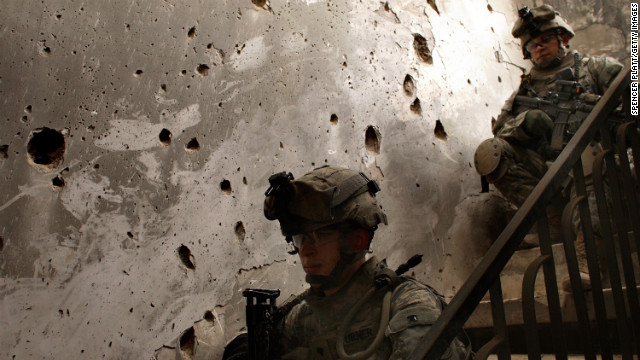 U.S. soldiers sit in a home damaged by fighting in Baghdad on March 11, 2008, near the five-year anniversary of the war.
U.S. soldiers sit in a home damaged by fighting in Baghdad on March 11, 2008, near the five-year anniversary of the war.
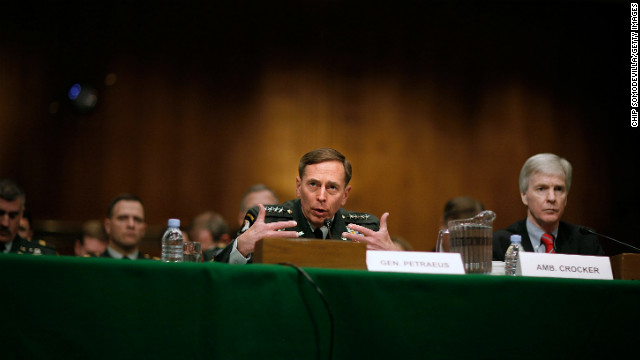 Commanding Gen. David Petraeus, center, and Ambassador Ryan Crocker testify before the Senate Armed Services Committee in Washington on April 8, 2008. In reporting on the success of the surge in Iraq, Petraeus said the number of U.S. troops in the country should not drop below 140,000.
Commanding Gen. David Petraeus, center, and Ambassador Ryan Crocker testify before the Senate Armed Services Committee in Washington on April 8, 2008. In reporting on the success of the surge in Iraq, Petraeus said the number of U.S. troops in the country should not drop below 140,000.
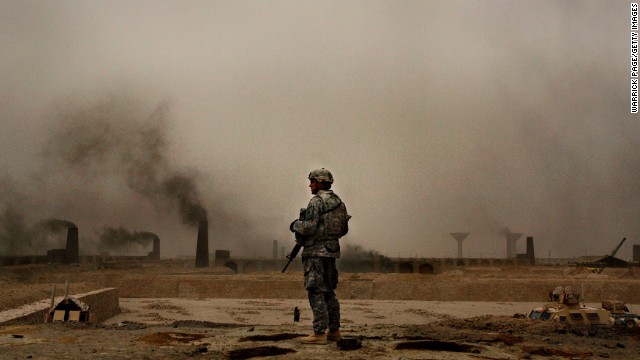 A U.S. soldier with 2nd Brigade, 1st Armored Division, stands on a kiln overlooking more than 150 brick factories in Narwan on July 1, 2008.
A U.S. soldier with 2nd Brigade, 1st Armored Division, stands on a kiln overlooking more than 150 brick factories in Narwan on July 1, 2008.
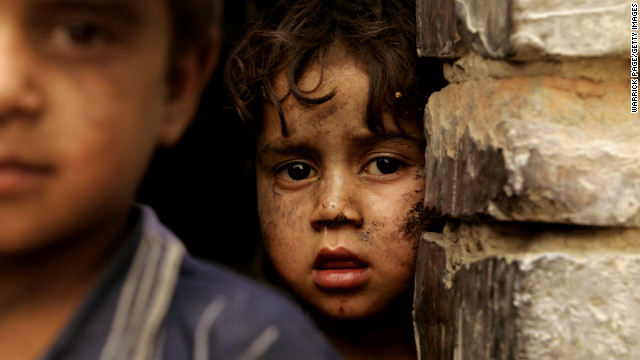 A boy looks out from his family shelter at a Narwan brick factory on July 1, 2008.
A boy looks out from his family shelter at a Narwan brick factory on July 1, 2008.
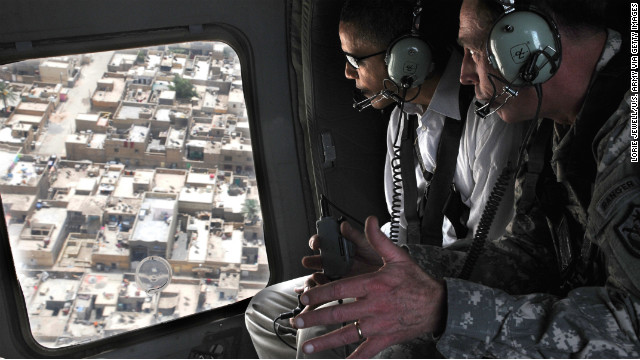 Democratic presidential candidate Sen. Barack Obama flies over Baghdad with Gen. David Petraeus during a tour on July 21, 2008.
Democratic presidential candidate Sen. Barack Obama flies over Baghdad with Gen. David Petraeus during a tour on July 21, 2008.
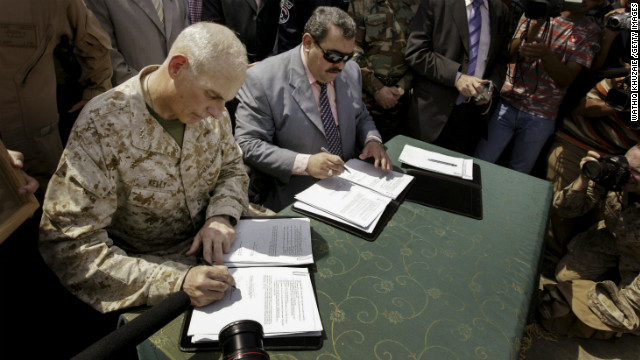 Maj. Gen. John Kelly, left, and Anbar province Gov. Maamoun Sami Rashid al-Alwani sign papers during a handover ceremony in Ramadi on September 1, 2008. The U.S. military turned over security control of Iraq's biggest province, once a stronghold of the Sunni insurgency.
Maj. Gen. John Kelly, left, and Anbar province Gov. Maamoun Sami Rashid al-Alwani sign papers during a handover ceremony in Ramadi on September 1, 2008. The U.S. military turned over security control of Iraq's biggest province, once a stronghold of the Sunni insurgency.
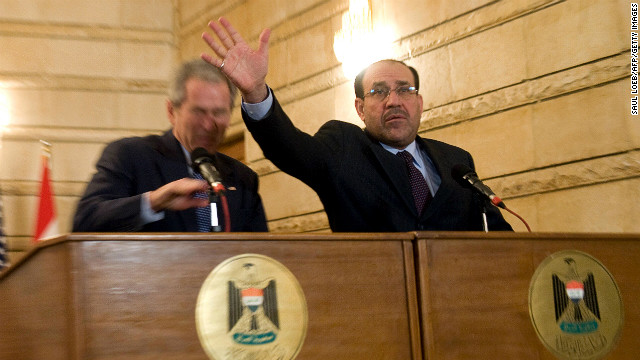 Iraqi Prime Minister Nuri al-Maliki tries to block a shoe thrown at President Bush during a news conference in Baghdad on December 14, 2008. The Iraqi journalist who threw the shoes missed the president but could be heard yelling in Arabic, "This is a farewell ... you dog!"
Iraqi Prime Minister Nuri al-Maliki tries to block a shoe thrown at President Bush during a news conference in Baghdad on December 14, 2008. The Iraqi journalist who threw the shoes missed the president but could be heard yelling in Arabic, "This is a farewell ... you dog!"
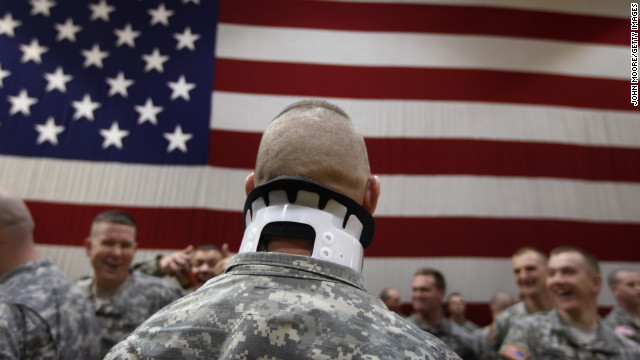 Pfc. Jeremy Tomlinson, who was wounded a year before in Iraq, waits with fellow soldiers to greet returning comrades in Fort Carson, Colorado, on January 28, 2008. About 3,800 soldiers were coming home after a 15-month tour of duty.
Pfc. Jeremy Tomlinson, who was wounded a year before in Iraq, waits with fellow soldiers to greet returning comrades in Fort Carson, Colorado, on January 28, 2008. About 3,800 soldiers were coming home after a 15-month tour of duty.
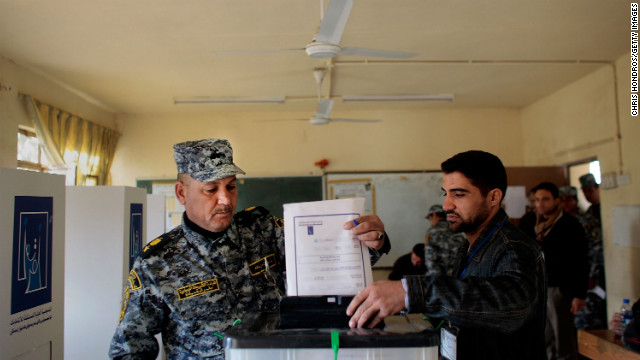 A poll worker helps a member of the Iraqi National Police cast his ballot in Baghdad on January 28, 2009. Polls were opened early to members of the Iraqi security services, many of whom would be working during the provincial elections.
A poll worker helps a member of the Iraqi National Police cast his ballot in Baghdad on January 28, 2009. Polls were opened early to members of the Iraqi security services, many of whom would be working during the provincial elections.
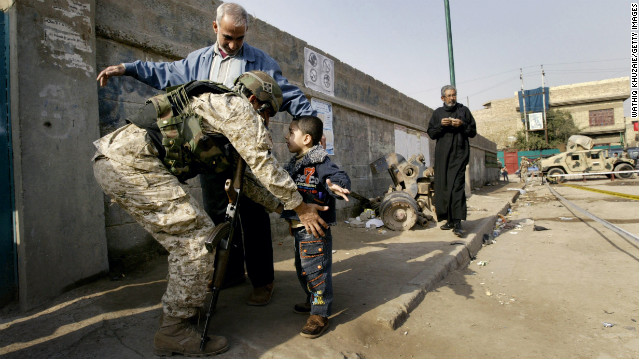 An Iraqi soldier searches a boy at a polling station in Baghdad on January 31, 2009. People across the country voted to fill 440 provincial council seats.
An Iraqi soldier searches a boy at a polling station in Baghdad on January 31, 2009. People across the country voted to fill 440 provincial council seats.
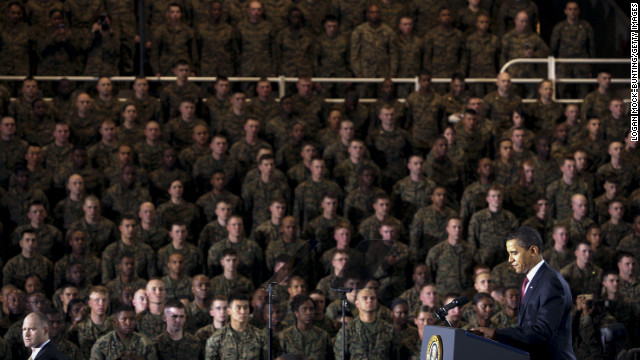 President Barack Obama delivers an address on February 27, 2009, at the largest Marine post on the East Coast, Camp Lejeune in North Carolina. In his speech, Obama outlined plans for the gradual withdrawal of U.S. troops in Iraq.
President Barack Obama delivers an address on February 27, 2009, at the largest Marine post on the East Coast, Camp Lejeune in North Carolina. In his speech, Obama outlined plans for the gradual withdrawal of U.S. troops in Iraq.
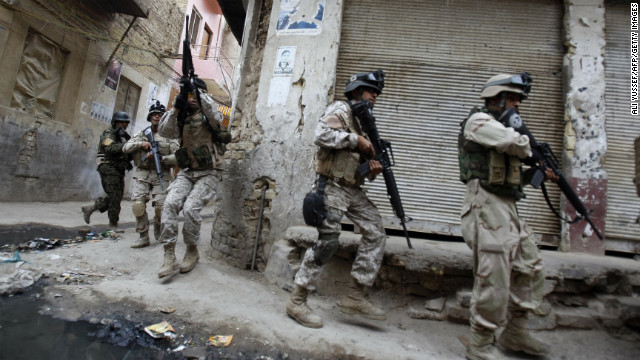 Iraqi army special forces patrol Baghdad's al-Fadel district on March 30, 2009. U.S.-backed Iraqi forces clashed with anti-al-Qaeda militants known as the Awakening Council, or Sahwa, after fighting erupted following the arrest of Adel Mashhadani, a Sahwa leader.
Iraqi army special forces patrol Baghdad's al-Fadel district on March 30, 2009. U.S.-backed Iraqi forces clashed with anti-al-Qaeda militants known as the Awakening Council, or Sahwa, after fighting erupted following the arrest of Adel Mashhadani, a Sahwa leader.
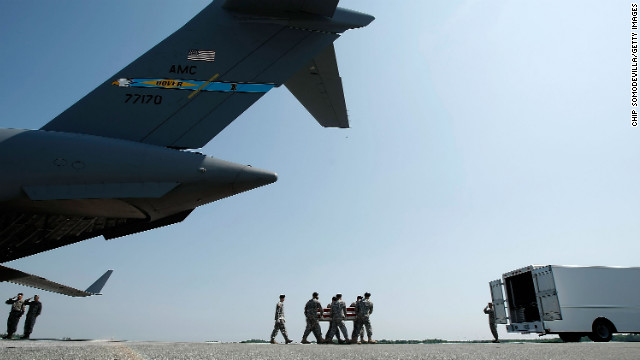 A U.S. Air Force team carries a flag-draped transfer case containing the remains of Army Spc. Omar M. Albrak of Chicago at Dover Air Force Base in Delaware on May 12, 2009, just over a month after the U.S. government lifted its ban on media coverage of the returning war dead. Albrak was killed while serving in Iraq.
A U.S. Air Force team carries a flag-draped transfer case containing the remains of Army Spc. Omar M. Albrak of Chicago at Dover Air Force Base in Delaware on May 12, 2009, just over a month after the U.S. government lifted its ban on media coverage of the returning war dead. Albrak was killed while serving in Iraq.
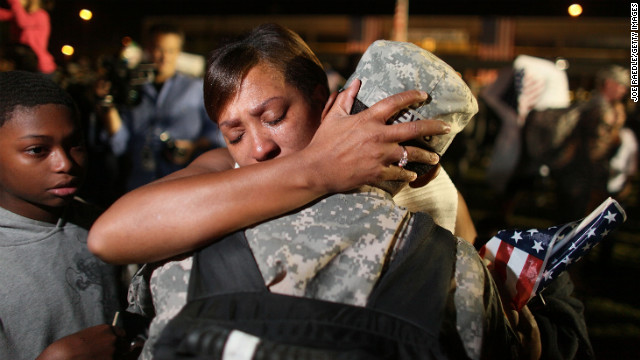 Army Sgt. Donald Lewis from the 1st Cavalry Division is greeted by his wife, Nicole Lewis, after his brigade arrived home in Fort Hood, Texas, on November 10, 2009, after a year of deployment in Iraq.
Army Sgt. Donald Lewis from the 1st Cavalry Division is greeted by his wife, Nicole Lewis, after his brigade arrived home in Fort Hood, Texas, on November 10, 2009, after a year of deployment in Iraq.
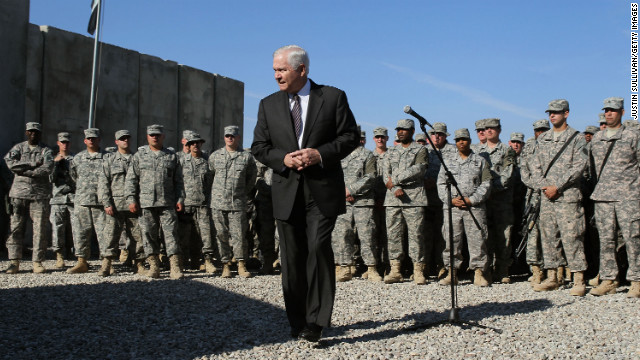 Secretary of Defense Robert Gates speaks with soldiers at a forward operating base in Kirkuk on December 11, 2009.
Secretary of Defense Robert Gates speaks with soldiers at a forward operating base in Kirkuk on December 11, 2009.
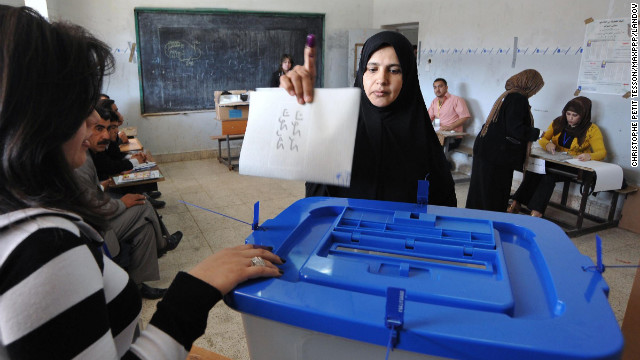 An Iraqi woman votes in parliamentary elections in Kirkuk on March 7, 2010.
An Iraqi woman votes in parliamentary elections in Kirkuk on March 7, 2010.
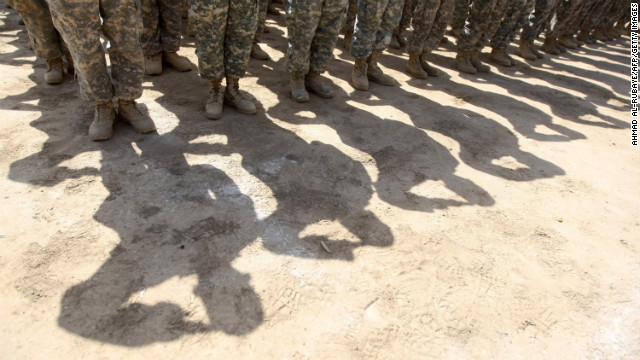 U.S. soldiers salute during a handover ceremony of the entry points of Baghdad's Green Zone, now referred to as the International Zone, to Iraqi control inside the heavily fortified compound in Baghdad on June 1, 2010.
U.S. soldiers salute during a handover ceremony of the entry points of Baghdad's Green Zone, now referred to as the International Zone, to Iraqi control inside the heavily fortified compound in Baghdad on June 1, 2010.
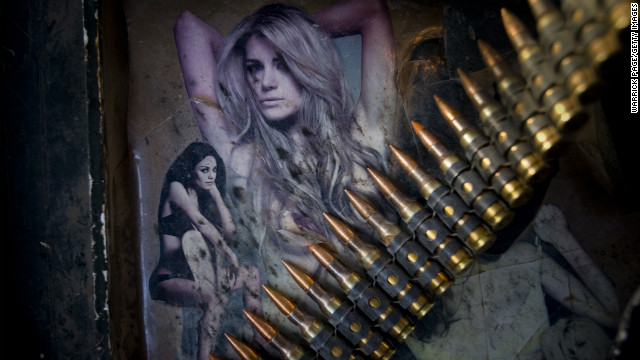 A string of bullets lies across photographs of women adorning the armor of a Stryker vehicle north of Jalaulah on June 11, 2010.
A string of bullets lies across photographs of women adorning the armor of a Stryker vehicle north of Jalaulah on June 11, 2010.
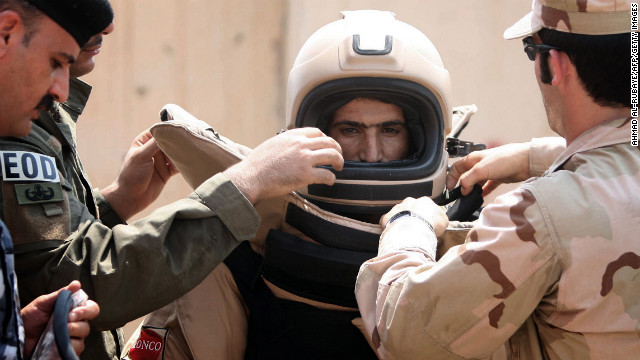 An Iraqi explosives expert gets into a special suit for bomb disposal during a training session organized by his U.S. counterparts at the Warhorse military base near the restive city of Baquba on August 17, 2010.
An Iraqi explosives expert gets into a special suit for bomb disposal during a training session organized by his U.S. counterparts at the Warhorse military base near the restive city of Baquba on August 17, 2010.
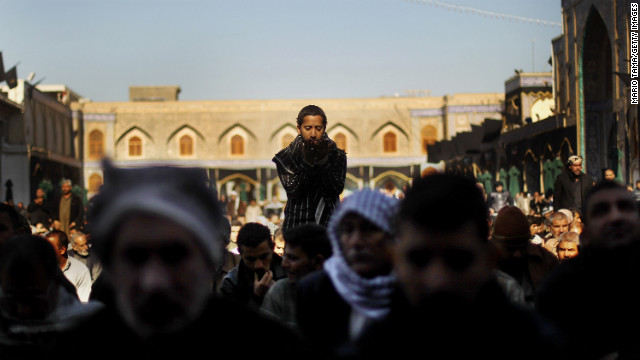 Shiite worshipers pray during an Ashura commemoration ceremony at the Kadhimiya shrine in Baghdad on December 6, 2011. Ashura marks the death of Prophet Mohammed's grandson, the revered Imam Hussein.
Shiite worshipers pray during an Ashura commemoration ceremony at the Kadhimiya shrine in Baghdad on December 6, 2011. Ashura marks the death of Prophet Mohammed's grandson, the revered Imam Hussein.
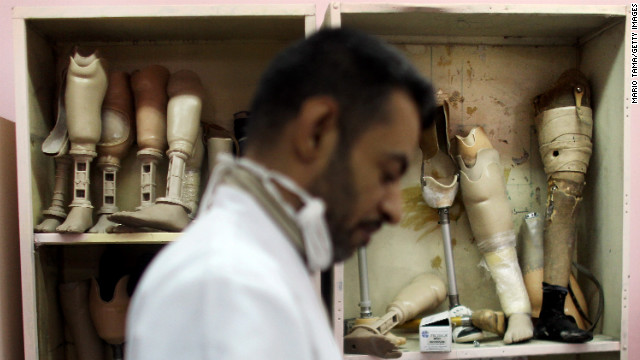 A technician works on a prosthetic at a factory in Baghdad on December 13, 2011. Iraqis have faced a shortage of prosthetics due to a spike in war-related injuries over the years.
A technician works on a prosthetic at a factory in Baghdad on December 13, 2011. Iraqis have faced a shortage of prosthetics due to a spike in war-related injuries over the years.
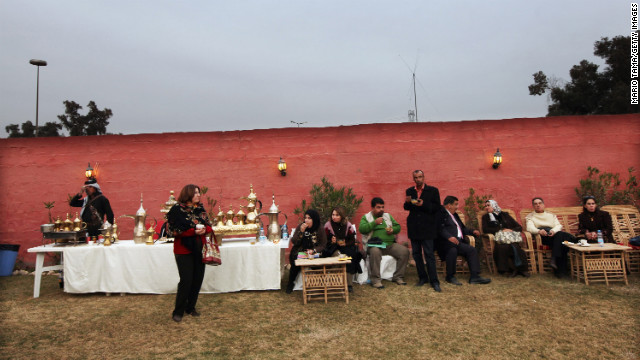 Iraqis gather at a women's art exhibition in a posh Baghdad neighborhood on December 14, 2011.
Iraqis gather at a women's art exhibition in a posh Baghdad neighborhood on December 14, 2011.
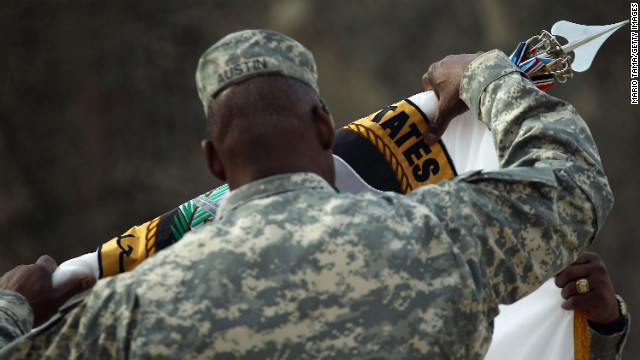 Gen. Lloyd Austin retires the United States Forces-Iraq flag during a casing ceremony at the former Sather Air Base in Baghdad on December 15, 2011.
Gen. Lloyd Austin retires the United States Forces-Iraq flag during a casing ceremony at the former Sather Air Base in Baghdad on December 15, 2011.
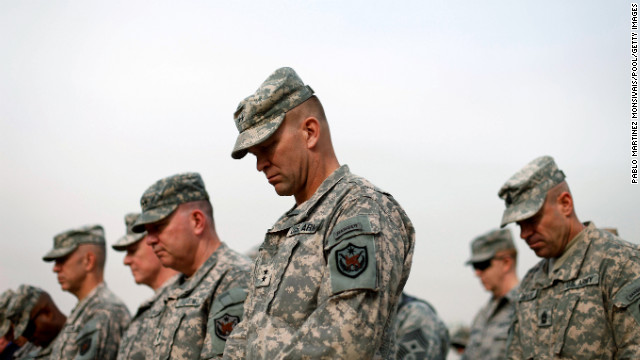 Military personnel lower their heads during the flag casing ceremony in Baghdad on December 15, 2011. The ceremony officially marked the end of U.S. military operations in Iraq.
Military personnel lower their heads during the flag casing ceremony in Baghdad on December 15, 2011. The ceremony officially marked the end of U.S. military operations in Iraq.
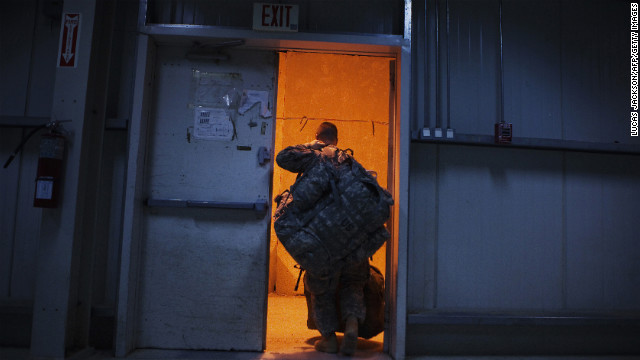 A U.S. soldier prepares to fly out of the Sather Air Base in Baghdad on December 15, 2011. The last U.S. forces left Iraq and entered Kuwait on December 18, nearly nine years after launching a divisive war to oust Saddam Hussein.
A U.S. soldier prepares to fly out of the Sather Air Base in Baghdad on December 15, 2011. The last U.S. forces left Iraq and entered Kuwait on December 18, nearly nine years after launching a divisive war to oust Saddam Hussein.
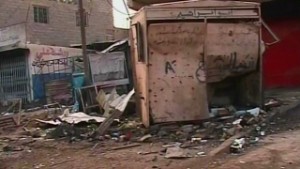

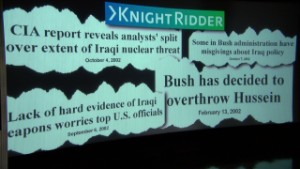
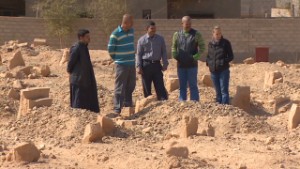

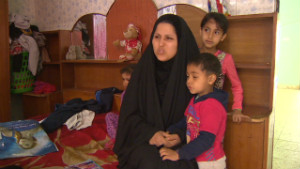

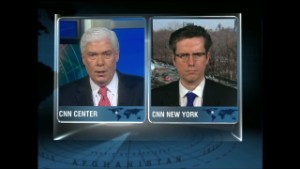
Posted: 03/18/2013 7:32 am EDT | Updated: 03/18/2013